#its collapsing of course. but from the top down. the local elections. which are still the bulk of elections in the US are by comparison to
Photo

New Post has been published on https://primorcoin.com/ftx-collapse-wont-impact-everyday-use-of-crypto-in-brazil-transfero-ceo/
FTX collapse won't impact everyday use of crypto in Brazil: Transfero CEO


The crumbling of the FTX crypto empire may have damaged Brazilian retail and institutional sentiment toward crypto. However, its impact won’t affect everyday citizens — who will still use crypto for cross-border transactions.
Reflecting on the recent fall of FTX, Thiago César, the CEO of fiat on-ramp provider Transfero Group said that the exchange’s fall, like in many countries around the world, has hurt confidence around centralized crypto exchanges and crypto in general.
Transfero Group is tied in closely with the Brazilian crypto ecosystem and FTX as it was the fiat on-and-off-ramp provider for the exchange and is also the issuer of Brazilian Stablecoin BRZ, which was listed on the now-defunct exchange.
César told Cointelegraph that the collapse of the exchange had removed a “big liquidity source” from the market, as FTX was ranked within the top three in terms of trading volume.
He also noted that uncertainty surrounding centralized crypto exchanges caused a “big outflow of funds” from exchanges in Brazil, with many looking into self-custody — estimating at least 20% of trading volume has been lost on exchanges so far.
“A lot of people are trying to even liquidate whatever positions they have in crypto and we just hold money in the bank account.”
César noted the FTX saga will make crypto investment a “harder sell” for new investors and traders.
“For the crypto investor/trader of course. It’s a harder sell now. If you go to a person who is not crypto savvy and you try to convince him to invest, especially in Brazil — the population has always been very skeptical of crypto. Now it’s harder,” he said.
However, he notes that for people that use crypto as a means for cross-border payments or the “internationalization of money,” there will unlikely be any impact from the FTX collapse.
“A lot of the crypto volume in Brazil derives from players that are willing to exchange their local currency into an internationally liquid asset denominated in dollars. So in that sense, the market will not die down because crypto is just rails for that.”
In October, a report from Chainalysis found that remittance payments and battling inflation were two of the most significant drivers of crypto adoption in Latin America.
Related: Brazilian SEC seeks to change its role in cryptocurrency regulation
César said the FTX collapse will likely be used by local exchanges “as a lobbying tool” to push for regulations aimed at bringing international exchanges in line.
César added that these crypto exchanges had been pushing for regulation in Brazil that would “segregate” local and international exchanges by taking away international exchange’s access to their global liquidity books.
“They were proposing that regulation would enforce for example, that liquidity on the books in Brazilian reais be segregated from international books.”
César explained that such regulation would hurt international exchanges as their main advantage comes from liquid, international global books.
In a Nov. 18 report from Reuters, Roberto Dagnoni, the executive chairman and CEO of Mercado Bitcoin said crypto laws in Brazil have been “kind of dormant” during the election period but now needed priority.
“The rules that currently exist have not been applicable to some players, so they can do whatever you want,” he said.
Source link
#Blockchain #BTC #CryptoNews
0 notes
Text
Burn The Bread Book: Industrial Communism Will Not Liberate You
The True Cost of Bread
For years I've watched a man drive his pick-up truck into the forest around me and cut down all the trees that aren't legally protected. So, every tree that isn't a pine or an oak. The moment a carob or olive or hawthorn or mastic or strawberry tree grows big enough to burn, he cuts it down and drags it away for firewood. He even fells trees I planted, while smiling and waving at me like he’s doing me a favor. I glare at him silently but don’t say a word, knowing he has the full power of the state behind him.
He uses the wood to fuel his traditional bakery which has several large outdoor ovens. The much-loved industrial product he produces is bread; a product that has rapidly replaced all the native food-bearing plants of the area as they’ve been cut down to make room for wheat fields.
The villagers are proud of the bakery because it attracts visitors from all over the island and thus creates further opportunities for them to earn profit. The local bureaucracy; the democratically-elected village council, gives the baker free reign to do as he pleases since so many livelihoods depend on his bakery.
Because the baker cuts everything down as soon as it reaches human height, the trees never get big enough to fruit, so they don't spread their seeds and grow new trees. The forest slowly dwindles to nothing but pine trees and can no longer sustain most animal life. The climate dries, the soil erodes, the air grows stagnant and depleted of oxygen. All that’s left in the few remaining forests that haven’t been bulldozed to grow more wheat is a sterile pine desert.
The baker will soon no doubt lobby the village council to allow him to harvest the pine trees too, otherwise the all-important bakery will cease to be operational when he runs out of legal trees to fell.
In just a few years, all the fruits, nuts and berries that sustained the people in the area for millennia are wiped out and replaced with a consumer product that is made from a single grain crop. A thriving ecosystem has been replaced with a wheat monoculture that could collapse at any moment and take the lives of everyone it feeds with it.
It’s worth noting that the baker, like most people in my village, and in fact most people on the island, considers himself a communist. The village has a “communist party” clubhouse and they always elect “communist” local leaders and vote for “communist” politicians in the national elections.
Any anarchist worth their salt has no tolerance for these faux-communists, or “tankies” and their brand of collectivist-capitalism because they cling to money, states and rulers and really only embrace Stalinist politics because of the promise of cushy government jobs for them or their relatives.
The Stalinist politicians openly buy votes by promising jobs in the public service to their supporters. A job in the public service here is a guaranteed free ride for life for you and your family, with the salaries multiple times higher than private sector salaries and benefits out of the wazoo - including multiple pensions. They get a full pension for each gov sector they worked in, and the more connected civil servants are rotated through jobs in multiple sectors in the last few months leading up to their retirement to ensure the maximum pay-out possible.
I’m confident anyone reading this knows Stalinism is designed to enrich the bureaucrat class and give them complete control over the state’s citizens. No anarchist sees that shit as communism. But in a “real” communist society; an “anarcho-communist” society where money, state and class have been abolished, the local baker would presumably still bake that bread, and since it would be offered freely to everyone far and wide, he'd need to bake a lot more of it and thus need more wood. More forest would be razed to keep the bread production going. Everyone living in the village and anyone passing through, and people in faraway cities will expect to have as much gourmet bread on their plates as they desire. More bakeries would need to pop up on the mountain as demand rises for delicious bread in the cities below, with the rural population working hard and doing their duty to feed the hungry urban population.
Over the years, I’ve put a lot of thought into envisioning how the workers seizing the means of production would end the environmental devastation this bread production brings to the mountain. I struggle to see any scenario where communism would stop the devastation being wrought on the ecosystem. The forests would continue to be razed to ensure production won’t slow down.
Free bread for everyone today means no bread (or any food) for anyone tomorrow as the top-soil washes away, the climate warms, the wildlife goes extinct, and the whole mountain rapidly turns to desert. It’s inevitable that soon even wheat will cease to grow in the fields surrounding the village.
Regardless of the economic system in place, the villagers being able to consume as many fresh loaves of baked bread as they can carry means all the forests in driving distance of the village are eviscerated, eventually all the fields become barren, the crops fail, and everyone starves. This is already well on its way to happening, and switching to a communist mode of production would do nothing to allay this inevitability.
“How would you feed people then, genius?” I hear you scoff. The answer is simple; tried and tested for millennia. I wouldn’t feed people. People would feed themselves instead of expecting others to labor to feed them; an entitlement that arose with industrial civilization. People would be inclined to protect the forests instead of bulldozing them for the supposed convenience of industrial food production if they picked their food directly from those forests everyday.
They’d protect the forests with their very lives because they’d need the food that grows in the forests to survive without industrial farms, bakeries and factories outsourcing food production and then hiding the ecocide they cause just out of sight of the villages and their carefully manicured streets.
Bread and other industrial products alienate us from our ecosystem and cause us to stop caring about how our food is produced, so long as it’s there in the store when we want to eat it. Putting food production back into the control of the individual is the only way to preserve the ecosystem. Direct food is the only anarchist mode of production. When other people are tasked with growing your food, they will take shortcuts because the food isn’t going into their own mouths or the mouths of their loved ones. Food harvesting needs to go back to being a way of life for every able-bodied person, rather than something industrial farm workers are tasked with to serve an elite class of privileged office workers who are completely disconnected from the food chain.
All over the world, complex centuries-old polyculture food-forests that sustained countless lives for generations are destroyed by the arrogance of industrial production, replaced for a short while by a wheat or corn monoculture so people can pick up their bread down the street from their home or workplace instead of muddying their feet to gather food from the wild as their ancestors did. This convenience seems like “progress” to civilized people, at least until the destructive industrial agriculture process renders the wheat fields infertile and farms all over the world are turned into a vast uninhabitable dust bowl. A sustainable way of life that kept us alive and thriving for centuries has been tossed aside in favor of a short-lived attempt at industrial convenience that has already proven itself a horrible failure; bringing us and every other lifeform to the verge of extinction.
Industry is not sustainable. Industrial systems are all destructive. Communism, capitalism, fascism, they’re all founded on ecocide. The authority of the baker is upheld over everything else because domesticated people would rather consume “free” industrial bread for a few years than unlearn their destructive consumerist habits. If we are to survive these times of devastating ecological collapse, humans need to go back to fostering vast food forests as our ancestors did for millennia; producing and gathering our own food without destroying the very ecosystem that gives us life in the name of luxury and convenience.
"The People's" Authority: How “Anarcho-Communism” is Authority-Forming
If someone kept cutting down all the trees to bake bread, the people who depend on the forest to survive would of course have to intervene to stop the loggers from destroying the forest and thus killing their way of life.
This happens in rainforests today where indigenous people who have been let down by the state gleefully issuing licenses to corporate loggers, and turning a blind eye to illegal logging, instead take matters into their own hands and shut down the loggers using force.
They put their lives on the line to do this, and a lot of them are killed by the loggers who value their profits over the lives of indigenous people. They know if they don’t act to stop the loggers, the forests they call their home will be decimated and their way of life will have been destroyed forever. They’ll be forced into the cramped cities and have to labor all day everyday to buy the bread and beef that stripped their forests bare.
So how would an anarcho-communist society deal with someone who cuts down all the trees to bake bread? In an anarcho-communist society, everyone will be environmentally conscious and consume sustainably, right...? No. Not if you’re engaging in any kind of critical thinking.
Loggers can only destroy forests at the current explosive rate if the society imbues them with authority. If they have no authority, there's nothing stopping others from using force to end their pillaging of our natural resources. Without the authority of civilization behind them, the loggers have incredibly diminished power and no real motive to risk their lives to fell trees.
Anarcho-communism is an industrial ideology based around the notion of seizing the means of production and then running the factories, saw mills, oil rigs, mines and power plants democratically. Industrial civilization is an incredibly totalitarian authority that is nevertheless upheld by “anarcho”-communist theory, even though anarchists supposedly oppose all forms of authority.
In an industrial communist society, much like in a capitalist society, logging is necessary to further the industrial production the society is built around. As long as production drives the system, trees will have to be felled for all kinds of reasons: from lumber and paper production to making way for crops and cattle.
So, logging is highly valued by the people that uphold the industrial society, and in a real world scenario, these “anarcho” communists would have to take measures to protect loggers from repercussions from a small, uncivilized minority – the indigenous inhabitants of the forest. These measures are, by any definition, an authority. A monopoly on violence. A state in everything but name.
But since the loggers are providing this valued service to good, decent, reasoned, educated, domesticated, egalitarian, democratic, civilized anarcho-communists in big shiny cities who are accustomed to a litany of luxury consumer products being delivered to their doors everyday… Decidedly authoritarian methods will need to be taken to ensure the anarcho-loggers can do their anarcho-work without facing retaliation from the “primmie” forest dwellers. These methods can easily be justified in the ancom’s mind; there’s nothing an ancom loves more than to “justify” authority with their mighty reasoned logic™️.
So when faced with the conundrum that the anarcho-communist city needs lumber, paper, corn and meat, and the only thing standing in the way of production is a few indigenous tribes, the ancom will put their anarcho-Spock ears on and declare: “the needs of the many outweigh the needs of the few”. Just as capitalist and socialist states today violently suppress the indigenous people who take action to shut down logging and mining operations that quash their way of life, the anarcho-industrialist will send a red-and-black army in to escort their red-and-black bulldozers and discipline anyone that interferes with the will of “the people”.
The indigenous inhabitants of course won’t give a shit that their forests are being felled by communists rather than by capitalists. They won’t give a shit that the bulldozers are now owned collectively or that the land they’ve lived on for millennia has now been designated as belonging to “the people” (the civilized voting majority) instead of to the state or to capital.
The forest that nurtures the indigenous people and their children is still being decimated to maintain the destructive lifestyles of apathetic city-dwellers. Their lives are still being ended because to civilized people, they’re a backwards, regressive minority standing in the way of progress... Damaging the revolution, inhibiting the growth of their glorious egalitarian civilization. The educated, “progressive” majority outvote them. Anyway, everyone who has spoken to a red anarchist knows primmies are dirty reactionary ableists who want to stop us from building wheelchair and drug factories, right?
Civilized people always have pushed the notion that the “common good” or the good of the many will always outweigh the needs of individuals or small groups of people, ever since Aristotle, in his "The Aim of Man” wrote:
"The good of the state is of greater and more fundamental importance both to attain and to preserve. The securing of one individual's good is cause for rejoicing, but to secure the good of a nation or of a city-state is nobler and more divine." Communism is even more adamant in this “the will of the majority is paramount” shtick, going as far as to declare the industrial-worker class as the only voice that matters, with everyone needing to become part of the worker class in order to abolish class differences.
This logic is why the USSR, China and other communist experiments forced collectivization on self-sufficient indigenous peoples and then slaughtered them when they inevitably resisted. If people won’t consent to being displaced from their ancestral lands to work on the industrial farms and factories that fuel the destruction of their homes, they’re branded “kulaks” and “counter-revolutionaries” and “reactionaries” and are systemically genocided, usually by destroying their food sources.
Industrial goods are valued by industrial society over the forest and its inhabitants because domesticated people want to eat bread and microwaved pizza and the real cost of those products (environmental destruction) is of no real concern to industrial society beyond empty gestures like an occasional “save the rainforests” or “go vegan” banner.
The inhabitants of the forests and their strange foreign culture are too far removed from the busy cities for the average urbanites to involve themselves in their plight. Even the civilized rural people who live around the forests are forever striving to urbanize their villages in the unending quest for upwards mobility. In my experience, they’ll happily trade every tree in sight for a gourmet bakery, Apple Store or coffee-shop so they can feel as civilized as the people in the big cities who tend to look down on them for being “hillbillies” or “country bumpkins”.
“The people in the big cities of Sao Paulo and Rio, they want us to live on picking Brazil nuts,” a farmer says. “That doesn’t put anyone’s kid in college.” (From RollingStone.com.)
The settler-farmers who are burning what’s left of the Amazon rainforest to the ground say they’re doing it for their children... To make the cash to pay for their children to be educated and get good jobs in the city. It shouldn’t be controversial for me to say civilized people value their civilized life and will always put their civilized needs before the needs of uncivilized others.
Civilized people can relate to their civilized neighbours who have the same struggles as them: paying their bills, educating their kids, buying good insurance, washing their car, deciding where to go on vacation, renovating their kitchens, choosing the next Netflix show to binge watch... So it’s not surprising that they’ll do everything they can to prop up civilized people and kick down the uncivilized people who stand in the way of their quest for ever-increasing industrial comforts.
I can already see the denial stage setting in on some of your faces as I type: “But us anarcho-communists aren’t like capitalists, we’re good caring people. Humane people. We’ll make industry green, we’ll manage the forests in a sustainable manner using direct democracy, unions, unicorns and equality!”
Why would anyone swallow that crock of shit? Why would thoroughly domesticated people used to all the comforts of destructive industrial civilization suddenly decide to forgo those comforts because of democracy? Why would 7.7 billion people suddenly change how they live because anarcho-communism has been declared? How would ancom civilization make industry “green” when it’s clearly demonstrable that all industry is destructive to the environment and to wild people, and modelling a society on an industrial system has had disastrous results throughout history, regardless of what the attached ideology was named?
All controlled mass-society, including every historical experiment at building a communist society has created authority; bodies of people that hold power over others. That power grows over time and takes the “communist” society further and further away from its revolutionary origins. Every indication is that authority would continue to be manifested with industrial anarcho-communism. There is no evidence that anarcho-communism would avert authority when it’s so dependent on destructive, exploitative, alienating, domesticating industry and the control and domination of a global population of workers.
All Industrial Goods Free for All People: A Recipe for Disaster
In communism everything is free for the taking and resources are often treated as if they're infinite. If you decide you need something, you take it from the communal store. Kropotkin said no one has the right to judge how much an individual needs, except the individuals themselves.
Since most reds hold that resources should be allocated according to “need”, decisions would need to be made to determine who in the community has “need” of the biggest shares of resources.
I know most ancoms, like Kropotkin, claim every individual will just take whatever they “need” (want) from communal stores, but I'm going to cry foul on that because it's really not practical in an industrial society. Resources aren't infinite and no one is going to spend their life doing gruelling manual labor and then just give everything they produce away to some random stranger who shows up at the communal store with a dumpster truck and says "I need your community's entire monthly output of goods today, so load it up". For some reason ancoms think assholes would cease to exist in a communist society. Why would anyone work their asses off, wasting their life away doing menial manual labor just to watch some shitlord drive away with everything they produced because he announced he “needed” it?
“But as woke anarcho-communists in an advanced fully-automated luxury communist society, labor will in fact be quite limited and fun because we can divide duties between all our comrades! And profit will no longer be a concern since everything we make will be given to anyone that wants it free of charge, so we don’t need to worry about marketing our products and that will further minimize the amount of labor we’ll do, giving us ample leisure time to enjoy the fruits of our production!”
For the purposes of cold-hearted mockery, I’m slightly paraphrasing an ancom who responded to an early draft of this piece. What fantasy realm are ancoms living in where all the massive problems posed by industrial production (including the ongoing extinction of near-every lifeform on Earth) will evaporate when you remove profit and marketing from the equation?
I keep saying this in my writing but here I go again: In an industrial society that aims to give everyone in the world equal access to consumer goods, industry does not decrease; it increases. If everyone in the world suddenly has free and equal access to the mountains of wasteful shit that Western consumers consider necessary to life, not only would production need to massively increase, but we would run out of resources to exploit much more rapidly.
That’s assuming anyone would even want to work in the mines and factories in a supposedly equal society if they no longer had guns to their heads. Why would anyone go back down into that mine once their chains are broken? Does anyone honestly think those Congolese kids give a shit if you have a new phone every year? Should they really be expected to sacrifice themselves for your entitlement? So you can continue to live in luxury with all your little conveniences?
In a real world implementation of industrial communism, communities will no doubt quickly impose limits on what can be taken from communal stores after a few people take way more than they have any right to and other people go without as a result, despite them laboring for hours a day to produce those goods. Kropotkin might insist we’ll all be happy toiling away all day to make this consumerist shit just to give it away to random strangers, but he was a privileged scholar who never had to work a day in his life, so what do you expect?
Industrial society right now is fed by the ceaseless labor of billions of exploited people in the Global South. People are forced to toil in mines from childhood to procure the materials that other people (also including children) then assemble into consumer goods in factories, all for starvation wages. This is debilitating, dangerous work that leaves the people who do it sucked of their youth after a few years.
Anyway, let’s play along with communist mythology for a bit to get to my next point. In an ideal communist society (where I guess minerals are somehow found equally all across the planet and not overwhelmingly located in the Global South as in the real world), outsourced labor would presumably go away because communists would never exploit workers in distant lands (who ever heard of an imperialist communist, right? Right??) So instead production would need to be localized, and then the goods would be distributed according to need.
For resources to be allocated according to need, you'll have some kind of deciding body in place to judge what each person's needs are; what resources each person should be given.
There are lots of factors to take into consideration when deciding someone’s “needs”, like how far they live from work, how far they live from the store, how many calories they burn doing the labor they do, the size of their family, their dietary restrictions, disabilities they might have, their particular metabolism, how many parties they throw, how many friends they have and thus might invite to the parties, their religious and cultural practices, the size of their house, the size of their garden, the type of insulation their house has and how quickly it loses heat, the fuel efficiency of their car... I could list hundreds more things but I’ll stop myself.
Giving bureaucrats this power will no doubt mean certain favored groups / individuals will be rewarded and less desirable groups / individuals will be neglected, or even punished. This is the nature of authority. You’ll need a body of full-time bureaucrats to collect all this data and measure how it should determine your share of the pie, and those bureaucrats are going to have biases. If a computer does it, the programmer will have biases. And you'd still need bureaucrats to collect the data and feed it to the computer. Then they could easily feed incorrect or selective data to the computer because of their biases.
It's always felt like a recipe for corruption and exploitation to me for a bureaucracy to determine someone’s worth... Which is probably why Kropotkin stipulated that everyone should be able to just take whatever they themselves decide they need from the stores.
Of course, the real solution would be to not base your proposed utopian society on industrial production in the first place... Promising industrial production will be unlimited because everyone will voluntarily agree to work real hard in the factories and mines and slaughterhouses and the goods will be distributed to everyone everywhere somehow while maintaining a sustainable ecological green solarpunk paradise just makes you a smug fucking liar. No different than a grinning politician promising to give us freedom, liberty and prosperity if we vote for him.
The only red anarchist tendency that made a modicum of practical sense in my mind was anarcho-collectivism, because at least the workers would receive the direct value of their labor hours instead of having external bodies decide how much value / worth to assign to them as a person.
If you're going to spend your life toiling in a factory or farm to produce goods for other people, would you really want a bureaucrat or a committee or even a direct voter body deciding how much you deserve for that labor, while giving someone who does the same job (or a much easier job) more than you because of potentially biased reasons?
Regardless, anarcho-collectivism still only really values the workers who are most willing to submit to the factory grind and put in the most hours. Anarcho-collectivism still holds ecodical industry and luxuries for cityfolk up above all life on the planet... So that 19th century ideology isn’t going to save you either. Throw it right in the trash with the bread book because this “reform-industrial-society” charade isn’t helping when the planet is on fire.
If industrial communism were actually implemented in the real world, you can be relatively certain that some kind of authority would need to be put in place to prevent bad actors from showing up at the store and taking a community’s entire monthly production. People would need to police the store and judge whether someone is worthy of taking as much as they’re taking. They’d need to become authorities, upholders of law and order. Purveyors of “justice”.
Let’s be clear now because I know a lot of red anarchists are going to try to “justify” this authority as being “necessary for the good of society” as they will do. Policing who can take food and how much they can take is a clear authority. Not a “justified” authority, because such a thing simply does not exist.
And this store-policing is not the anarchist tactic of “direct action” either, let’s make that clear right now, because it’s a frightenly common misunderstanding with red anarchists. Creating a police force has nothing to do with direct action.
Direct action is an isolated use of force unconnected to institutional systems of power. People who engage in direct action are not appealing to a higher authority for legitimacy. Their action is not legitimized by anyone and they receive no protection or reward from an authority as they take the action. There’s no monopoly on violence being granted to them by an authority, so there’s nothing to guarantee their safety from retaliation if the action fails or succeeds.
There’s no institutional power-imbalance being created when someone takes direct action against an authority. The authority already created the power imbalance, and your direct action is a form of defense to shield you, your ecosystem or your community from that imbalance.
Direct action is an entirely anarchist tactic, but pinning badges on people, officiating them, and giving them the authority (and the monopoly on violence) to police a store and withhold food and products from certain people for whatever reason has nothing to do with anarchy. Building a hierarchy like this has nothing to do with anarchy.
Police officers and judges (authorities) ruling over a communal store is authoritarian. An officiated police force is a completely different thing from the isolated use of force by a lone actor or a small group of actors to preserve life and combat authority (direct action).
Creating a police force, even if it’s formed of volunteers, even if they were elected, even if they make decisions collectively, even if their uniforms are red and black, even if the officers placed on duty are regularly rotated, is authoritarian by any definition. There are no anarchist cops. An “anarchist cop” couldn’t be a bigger oxymoron.
Here’s an example of direct action: me punching a logger who is cutting down my favorite tree. This action is completely removed from structural systems of authority because I have no authority or structural power behind me. There’s nothing legitimizing my use of force or giving me a monopoly on violence. My use of force doesn’t extend beyond my own two fists. Since assault is illegal, and his logging is legal, the logger has the full authority of the law behind him, so any action I take to oppose that authority is punching up. It’s fighting to curve a gross power imbalance. It’s anarchy.
In this civilized world, I could be severely punished by law enforcement for using force to stop his desecration of a forest. As the state gave him his logging permit, he has authority over the forest and every life that depends on the forest to survive. He punches down every time he fells a tree. He is the full embodiment of archy. If I choose to stand in his way, there’s no state behind me, no court, no police force. Me physically stopping a logger from felling trees is an isolated use of force to strike back at a system of authority. The logger destroys life for profit, and if I take action to stop him because I don’t want to see the forest become a barren desert, I don’t become a state or any kind of authority based on that decision to fight back.
Forming a police squad and a bureaucracy to patrol and govern an officiated communal store, appointing authorities to sit and judge how much each individual deserves to eat, on the other hand, creates legitimized systems of power and an institutional monopoly on violence. It creates a state, or at the very least a proto-state that will later develop into a full-blown state as the bureaucracy grows.
The German philosopher Max Weber defined the state as a monopoly on the legitimate use of physical force. State violence, whether it’s committed on behalf of the state by a politician, a judge, a cop or a logger, is always a legitimate force. Any violence the state does is immediately “justified” simply by virtue of it being dispensed by a legitimate state actor who is doing it for the good of the state and its authority.
A logger with an official permit to slice up a forest is thus fully justified in the eyes of society to do as much harm to the forest as is deemed necessary by the authorities who granted the permit.
A state exists wherever an authority can authorize and legitimize violence. There is no way for an anarchist to “justify” a coercive, authoritarian institution such as a police force that will no doubt be biased against minority groups and lead to the accumulation of power by the dominant group, and abuses of power by the people doing the policing. Even if minority groups are involved in the police force, the majority group will still oppress their groups.
A society that mass-produces goods and distributes them in communal stores will manifest itself as a state, regardless of Kropotkin’s insistences that everyone will work voluntarily and then take whatever they want from the stores. There’s no practical scenario where industrial labor is truly voluntary. There’s no practical scenario on this Earth of rapidly diminishing returns where “free” stores won’t need to be policed to deny unlimited goods to individuals and groups who the governing body decides are less worthy of the fruits of their labor.
Anarcho-communism simply isn’t revolutionary as long as we are depleting all our resources in the name of industrial civilization; something anarcho-communism demands as an industrial, work-based ideology that revolves around civilizing the land and its inhabitants in order to extract resources and labor. There’s nothing revolutionary about continuing the global ecocide under the guise of democracy. Every anarchist should understand the difference between isolated force and authority, but very few self-identifying social anarchists seem interested in this and are content prating on about “justified authority”, debating “how an anarcho-communist police force could work” and excitedly discussing Chomsky’s latest speech telling them to vote for a lesser-evil neoliberal politician.
I know I sound bitter, but I’ve been disillusioned with the majority of red anarchists I come into contact with for years now and they only seem to get worse as industrial society plods on and the sands and seas climb further up our necks.
Anarcho-communism is not the solution to fighting authority, it’s simply a skin-deep re-brand of authority. A sparkly new paint job. There’s a reason so many ancoms strive to “justify” authority. They don’t actually care about reaching for anarchy.
Is Communism Always Authority-Forming?
In my mind, communism can only work outside of industrial mass society. A small community gathering or growing supplies and freely sharing them with the rest of the community. Each community trading with other small communities. Marx and Engels ironically dubbed this hunter-gatherer form of society that had long existed in human history as “primitive communism” and suggested it was inferior to their advanced industrial communism that valued the factory and centralized city life above all else.
Mass industry requires mass agriculture, mass labor, mass transport, mass resource extraction, mass construction, mass policing, mass military... Mass society and will only lead right back to capitalism and statism because it's so unwieldy and authority forming. Any communist tendency built around industrial exploitation is going to create all kinds of fucked up hierarchies and just lead us right back to the apocalyptic status quo.
Most communists I’ve talked to about this are unable to accept that some people will still act like assholes if capitalism collapses, which I’d probably find endearing if these people weren’t such giant assholes themselves; calling me a privileged reactionary for daring to suggest their blessed ideology might have some flawed logic. They insist everyone will cease being selfish assholes once capitalism is done away with because “assholes are only assholes as long as capitalism pits them against each other.”
Even if we wake up one morning and marketing, consumer culture and wealth are all done away with, we still have generations of indoctrination in authoritarian behavior to contend with. That doesn't go away overnight. But even without consumer culture to guide them, people are still completely capable of being assholes. Going back to before mass-society even existed, people would murder each other and take their stuff. They'd raid each other's settlements, they'd steal their children, they'd fight over territory and cultural differences. These aren't things that were invented by capitalism and they won’t go away just because communism is declared.
People aren't inherently just or unjust. Humanity is not good or bad. Every person is an individual, each with different experiences, motivations, traumas. Communism expects everyone to be altruistic. Capitalism expects everyone to act out of greed and self preservation. Neither is true because both are ideologically driven worldviews that attempt to define human nature in order to instruct us how to behave by instilling us with their morals. People are greedy, people are generous, people are kind, people are mean-spirited. Every person in the world is all of these things and more. People are not defined by one single personality trait their entire lives.
I’m haunted by every shitty thing I’ve ever done and I’m sure I’ll do more shitty things yet, despite my best intentions. No one is above making mistakes. Mutual aid is a great thing, but it needs to be earned. There are people in our lives that we trust and people we can’t stand to be around. Not everyone is deserving of the products of our labor. Some people in the world will always try to exploit you, even if they already have everything their hearts could possibly desire. Some people will be kind to you no matter how big an asshole you are.
I’ve been accused by communists of being cynical, of being “regressive” and “counter-revolutionary” because I don’t buy into the communist notion that humans are inherently good and they just need the right industrial system to bring that good out of them.
Any society where I’m expected to just sit back and watch as a logger destroys my ecosystem because he’s serving the “greater good” isn’t a society I want any part of. I value my autonomy over the desires of traumatized workers pushing buttons for 8 hours a day in a city far-removed from me. I’d rather take the logger’s chainsaw away than fiddle my thumbs as he takes everything I know, and to hell with whatever bureaucratic process enshrined him with the right to decimate the forest to give bread to the workers. Fuck the workers and their bread and their fully-automated luxury communism and their divine democratic rights.
There’s simply no reason to believe exploitative assholes will go away if communism is ever enacted.
There’s a man I know who constantly exploits me for my labor, and I always go along with it. He dangles a carrot on a stick in front of me every time; promising that after I help him, he’ll hook me up to his well so I can have free water for my trees. For years he’s made this promise.
I’ve spent countless hours doing dangerous work for this guy with no reward. He always disappears after I do the work without giving me what he promised. Then the next week he wakes me up again at 6am on a Saturday by honking his horn, apologizes for not getting around to hooking me up to the well yet, saying he was too busy or in the hospital or had a family emergency, promises he’ll do it this week, and then I’m hanging off a cliff or a roof repairing pipes for him all day while he barks orders at me.
I do it because I’m a fucking pushover who can’t say no to people due to my ridiculous kind nature. But whenever I ask him for anything, I’m met with a blank stare, an abrupt subject change or a sorry excuse. I was stranded a two hour walk down the mountain last week when my car broke down, and he drove right around me and didn’t even slow down. When I saw him later, he swore on his life that he didn’t see me because the sun was in his eyes. I nodded and shrugged.
Communism wouldn’t stop this lying dipshit from exploiting me; he’d still need someone to fix his leaky pipes, start up his diesel generator, saw off the upper branches of his olive trees and climb shoddy makeshift structures for him regardless of the economic system in place. He’d still give me a sob story about his painful ulcer and I’d still do the hard work to spare him the pain of doing it himself. He wouldn’t stop being an exploitative asshole just because democracy is installed in the workplace. He wouldn’t start practising mutual aid when he goes to great lengths to avoid all work and shames other people into doing it for him.
Red anarchists throw every insult in the book at me when I voice my doubts about their wistful ideologies; condemning me for being critical of the amazing breadman Kropotkin or their “green industry” tsar Professor Bookchin... It’s hard to give my perspective as an indigenous anarchist to these people who are so hostile to any worldview that doesn’t validate their luxurious industrial lifestyle and their driving desire to make that lifestyle more democratic in order to receive a bigger share of the pie.
Between the shouts of “reactionary lifestylist” and “dirty primmie” they lobby at me, I try to explain my perspective to them. I see suffering in the world and I want to make sense of it. I’m not satisfied just handwaving it away and clinging to fanciful utopian ideologies designed to energize European factory workers from the 1800s. I don’t believe red-industry will cure society of all its ills and free humans from their chains.
The warehouse I’ve worked in for more than a decade will not become magically liberating if I’m given the power of democracy. It’ll still be a miserable fucking place filled with toxic pesticides that are slowly killing me.
Some ancoms will no doubt unironically reply to this piece with reasoning that just amounts to "no, actually, anarcho-communist industry will be a utopia because Kropotkin said so". They’ll quote a bunch of literature to me that is nothing but empty promises by long-dead European philosophers for industrial egalitarianism. I’ve really run out of patience for that line of thinking. It’s no different than a 7 year old trying to win an argument by insisting “because my dad said so”... But when it comes down to it, that’s all most reds can do. Quote their heroes and cling to the hope that they’ll be proven right some day. That hope is what keeps them going as their miserable civilized lives burn the world up. “All our suffering will end once we have democracy in the workplace”. Those poor, deluded, hope-filled souls.
Everything I know tells me industry cannot be made "green" any more than capitalism can be made ethical. All agricultural industrial society in history has resulted in ecocide and eventually collapse. When you extract resources, burn fuel, manufacture goods and distribute them to millions or billions of people, you do real irreversible harm to ecosystems and human lives. Ancoms are not magical beings that can somehow escape the consequences of this because they're supposedly "good" and “egalitarian”.
If anarcho-communism were ever attempted, half the "nuances" it has will be thrown out for being fantastic, half-baked and impossible to implement in an industrial mass-society. Compromises will be made to make the system functional. A lot of things have been claimed about communism, but whenever its been attempted in real life models, almost none of those claims have come to fruition and they never will because:
a) Resources aren't infinite.
b) Industrial output has a high 'hidden' cost, and most importantly:
c) Work isn't voluntary.
No matter how much you swear you’ll make labor democratic, no one is working because they really want to. They’re working because the system requires them to work to survive. No amount of democracy will stop the system from asserting its authority on everyone inside its suffocating walls. Abolishing the borders between territories will do nothing if industrial civilization continues to box us in and starve us if we dare to resist its rule. If we can’t escape civilization, the whole world is nothing more than one big prison.
Civilized people labor to create consumer goods because the system gives them no other option if they want to survive. The only way people will continue to toil in the factories and warehouses in "a communist society" is if they are forced to by the system. No free hunter gatherer will voluntarily give up their freedom to stand at an assembly line pushing buttons so other people can have Corn Flakes, weedkiller and AAA batteries. It's something that needs to be forced on humans by domestication and the joined threat of violence and starvation that props up the industrial system.
Industry is a clear authority and anarcho-communist theory is completely oblivious to that. Anarcho-communism is nothing more than an attempt to reform the tyranny of civilization to give it a sly smile. It’s the anarchist version of Barack Obama promising change but just delivering more of the same and expecting you to celebrate it.
Seize the Means of Destruction! (And fucking burn it to the ground…)
Ancoms insist “people would choose to produce only what is needed” in an anarcho-communist society. That word; "needed" is really useless. Anyone can define anything as being "needed", but almost none of the things defined as such are actually needed. This is why industrial communism isn't really compatible with anarchy: anything and everything will be defined as "needed" by domesticated people, no matter how authority-forming the things are. If it means they get to keep consuming, anarcho-consumers would happily define everything from pesticides to slaughterhouses to automobile plants as “needed”. This is the power of democracy. Whatever narrative the collective adopts becomes the official, approved narrative and anyone questioning it will be seen as subversive and dangerous and a threat to order and common decency.
This "needed industry" argument is a lot like the "justified authority" argument a lot of red “anarchists” keep making to uphold every shitty authority they cling to all the way up to the state, prisons and the police.
Usually they’ll just rename these authorities “the commune”, “the social re-integration facility” and “the peacekeepers” and be satisfied that they’ve come up with a real change. It's meaningless. Domesticated people will not allow themselves to see past the carefully manufactured alienating world they’ve inherited. Very few civilized people are willing to risk losing what they perceive as the great comforts imbibed to them by industrial civilization.
Even if they recognize how strangling these “comforts” actually are to them and everything else on the planet, instead of rejecting them outright, they draw up elaborate plans to reform the way those “comforts” are produced and dispersed. Most of these plans, when deconstructed and debullshitted, ultimately amount to little more than slapping the word “anarcho” in front of everything and trusting it’ll be all good because it’s anarchized now.
People thrived without industry and agriculture for millennia. Civilization has led to the extinction of near everything on the planet. 99.9% of industrial goods are not "needed" by humanity, they're wanted.
Ancoms aren't going to suddenly decide to give up their phones, Doritos and washing machines when they find out they're environmentally destructive. They'll just rubber-stamp all the things they want as "needed", “eco-friendly”, “sustainable” or “green” and call it a day. And we’ll be expected to keep working our miserable jobs and like it because now they’re anarcho-jobs in an anarcho-society with anarcho-exploitation and anarcho-masters.
Keeping people in the mines and factories building those consumer goods that "the people" decide they "need" will require massive authority that will be just another iteration of capitalism in all but name. Just like “communist” Russia and “communist” China and “communist” North Korea. Not a trace of communism will survive once industrial civilization is done grinding everything up. There’s nothing about “anarcho-communism” that will spare it from the same fate. Claiming to be anti-authority rings hollow when you cling to authoritarian industrial civilization, workerism and all the other authorities ancoms at large decide are “justified”.
A bureaucracy will always be instilled in an organized mass-society and this is why industrial communism isn't tenable. It’s why every time industrial communism has been attempted, it has simply been manifested as a perverse collective-capitalism with even more centralized power than regular-flavor capitalism. The bureaucracy will quickly morph into a state, and by definition the society will no longer be communist. But of course, it’ll keep calling itself “communist” and ensure the distinction between capitalism and communism remains paper-thin so people won’t be able to envision a better world than the brutal industrial wasteland we’ve all been born into.
Any system that allocates resources and polices people is functionally a state, regardless of what it brands itself as.
All implementations of industrial society have failed to liberate people, instead making their lives more and more miserable with each stage of industrialism, and to claim that attaching “anarcho” to the front of an industrial system will make a difference is absolutely fucking ridiculous.
Communism has never succeeded at liberating us historically and will not suddenly succeed just because you promise you’re better than other communists and you and all your super-libertarian ancom comrades will pick up cans of paint and make all the chimney stacks bright green.
Authoritarian behavior will only ever be repeated if society is structured around authoritarian institutions like industrialism and democracy. Both Marx and Kropotkin’s communism are centred around these institutions because their ideologies require that people be controlled by bureaucracy. Whether it be decentralized democratic bureaucracy or centralized party bureaucracy is irrelevant. The result is the same: Authority and control.
Without this bureaucracy, the society would descend into anarchy. Yes, wonderful, amazing, freeing anarchy. The very thing every red fears most because it would mean they’d no longer get to forcibly structure society and people around their sacred ideology and force their authority and morality on them. Domesticated people sit trapped in sterile little boxes, fed a steady drip of pesticide and high-fructose corn syrup as they labor, consume, consume, consume and then die.
This isn’t life. This isn’t anarchy. This is a waking nightmare, a depraved hell-world that has all of us thoroughly brainwashed into thinking it acceptable. Branding it “communist” or “libertarian socialist” or “democratic” or “egalitarian” or “decentralized” or “anarcho-communist” will not end the nightmare. It will not stop the planet-wide ecocide civilization has wrought on all living things. The means of destruction being controlled by industrial workers instead of industrial bosses will not stop the ecocide.
Seizing the factories and making them democratically managed as all reds yearn to do won’t do anything to save us from violence, misery, alienation and eventual extinction.
The only way to destroy authority is to burn industry to the ground before it devours every last lifeform on the planet.
The only chance we have to survive what’s coming in the next few years as our ecosystems are collapsing all around us is to tear down every factory and close every port and slice up every road until civilization is in ruins.
But in all honesty, we’re not going to do that. We’re going to watch television and sip iced tea and we’re going to wait for the end. I’m going to keep watching in silence as the local bread man fells the last remaining wilderness.
Maybe the planet will recover somewhat in a few millennia and maybe the next lifeform that evolves will have more sense than the desertmakers. This is the last hope I cling to.
#ziq#industrial civilization#anticiv#anti civ#civilization#collapse#communism#ethics#authoritarian left#green anarchism#green pessimism#anarchism#post left#individualism#doomsday anarchy#industrialism#anarcho communism#anarchist communism#lifestylism#social ecology#kropotkin#the bread book#peter kropotkin#desert#read desert#against the world builders
121 notes
·
View notes
Text
Saturday, March 20, 2021
More than 40% of people reported depression and anxiety symptoms since start of pandemic, survey finds
(Yahoo News) When COVID-19 was first reported in the United States, many were optimistic that it would come and go quickly enough. But after a few weeks, reality set in and took a toll, not only on our physical selves but on our collective mental health as well. Over the past year, a lot of people have struggled with feelings of isolation, anxiety, depression and despair due to the global pandemic. Many have lost loved ones, missed funerals and births and other milestones, and dealt with emotions that some may not have even experienced before. What has been the overall mental health impact on our nation’s people in the past year? According to a recent survey by Yahoo/YouGov, 35 percent of adults in the U.S. report that their mental health has worsened since the start of the pandemic. And an even larger percentage (44 percent) report an increase in depression in the past year, with 48 percent stating that their anxiety symptoms also increased. “The mental health impacts of COVID-19 are just beginning to be understood fully,” says Catherine Burns, a Vermont-based psychologist and clinical supervisor for COVID Support Vermont. “As time passes, we are developing a clearer picture that increasingly highlights experiences of stress, anxiety and depression across the globe.”
Polluted waters around the world
(Reuters) About 4 billion people experience severe water shortages for at least one month a year and around 1.6 billion people—almost a quarter of the world’s population—have problems accessing a clean, safe water supply, according to the United Nations. While the UN’s Sustainable Development Goals call for water and sanitation for all by 2030, the world body says water scarcity is increasing and more than half the world’s population will be living in water-stressed regions by 2050. In the run-up to the UN’s World Water Day on March 22, Reuters photographers used drones to capture dramatic pictures and video of polluted waterways around the world. In one image, a discarded sofa lies beached in the Tiete river, in Brazil’s biggest city Sao Paulo, into which hundreds of tonnes of untreated sewage and waste are tipped each day. Others show domestic waste clogging the Citarum river in Bandung, Indonesia, and sewage flowing into the Euphrates in Najaf, Iraq.
Gunmen kill 13 police in daytime ambush in central Mexico
(Reuters) Gunmen killed at least 13 Mexican police in an ambush a short distance outside the capital on Thursday, local authorities said, in one of the worst mass slayings of security forces to rock the country in recent years. Photos of the grisly scene circulated on social media showing a bullet-riddled police car and an unmarked truck, along with officers’ bodies scattered out along the street or still inside the car. The convoy of security personnel was attacked in broad daylight by suspected gang members in the Llano Grande area in the municipality of Coatepec Harinas as it patrolled the area, said Rodrigo Martinez-Celis, security minister for the State of Mexico. The area is southwest of Mexico City and about 40 miles (64 km) south of the city of Toluca, the capital of the populous State of Mexico, which surrounds much of the capital.
British Airways considers selling its headquarters after homeworking switch
(Reuters) British Airways said it was considering selling its headquarters building because of a switch to homeworking during the pandemic means it may no longer need so much office space. The shift to homeworking over the last year has already prompted some of Britain’s biggest companies to make changes to their office footprints. Banking giant Lloyds said it would cut office space by 20% within three years, with HSBC aiming for a 40% reduction.
Locked-down Spaniards seethe with envy as Germans flock to Mallorca
(Reuters) Tens of thousands of Germans are planning last-minute Easter getaways to Spain’s sun-kissed islands, leaving many Spaniards, who are not allowed to do the same because of a travel ban, upset. “It makes absolutely no sense that in Spain we can’t move between regions but any foreigner can come in ... and spread infection,” said Emilio Rivas, 23, who lives in Madrid. The young tax assessor wanted to get out of town for the holidays but must instead stay home because Spain banned travel between regions over Easter to avoid a repeat of a spike in contagion seen after an easing in restrictions over Christmas. But tourists from European countries with higher infection rates like France or Germany can fly in for a holiday as long as they have a negative covid test result—something even top health official Fernando Simon described as “incongruous.”
Paris goes into lockdown as COVID-19 variant rampages
(Reuters) France imposed a month-long lockdown on Paris and parts of the north after a faltering vaccine rollout and spread of highly contagious coronavirus variants forced President Emmanuel Macron to shift course. Since late January, when he defied the calls of scientists and some in his government to lock the country down, Macron has said he would do whatever it took to keep the euro zone’s second largest economy as open as possible. However, this week he ran out of options just as France and other European countries briefly suspended use of the AstraZenca vaccine. His prime minister, Jean Castex, said France was in the grip of a third wave, with the virulent variant first detected in Britain now accounting for some 75% of cases. Intensive care wards are under severe strain, notably in Paris where the incidence rate surpasses 400 infections in every 100,000 inhabitants.
US-Russia ties nosedive after Biden-Putin tit-for-tat
(AP) U.S.-Russia ties nosedived on Thursday after Russian leader Vladimir Putin shot back at President Joe Biden’s description of him as a killer. In taking a tough stance on Russia, Biden has said the days of the U.S. “rolling over” to Putin are done. Also Wednesday, U.S. intelligence released a report finding that Putin authorized influence operations to help Trump’s re-election bid. Later that day, Putin recalled his ambassador to the U.S. and on Thursday he pointed at the U.S. history of slavery and slaughtering Native Americans and the atomic bombing of Japan in World War II. Responding to that, the White House said Biden would continue to look to work with Putin on areas of mutual concern but stressed that he was “not going to hold back” when he has concerns about Putin’s actions. Putin had been asked about Biden’s comment during a video call marking the anniversary of Russia’s 2014 annexation of Crimea, and he responded along the lines of “it-takes-one-to-know-one,” saying his counterpart’s words reflected the United States’ own problems. At the same time, he offered to have a phone call with Biden to discuss issues of mutual interest.
Myanmar security forces kill eight as Indonesia calls for end to violence
(Reuters) Myanmar security forces shot dead eight opponents of a Feb. 1 coup on Friday, a funeral services provider said, as Indonesia sought an end to the violence and urged that democracy be restored, in an unusually blunt call from a neighbour. Ousted lawmakers explored whether the International Criminal Court (ICC) can investigate crimes against humanity since the coup, while authorities arrested two more journalists, including a BBC reporter, media said.
Lebanese are gripped by worry as economic meltdown speeds up
(AP) Shops closing, companies going bankrupt and pharmacies with shelves emptying—in Lebanon these days, fistfights erupt in supermarkets as shoppers scramble to get to subsidized powdered milk, rice and cooking oil. Like almost every other Lebanese, Nisrine Taha’s life has been turned upside down in the past year under the weight of the country’s crushing economic crisis. Anxiety for the future is eating at her. Five months ago, she was laid off from her job at the real estate company where she had worked for years. Her daughter, who is 21, cannot find work, forcing the family to rely on her husband’s monthly salary which has lost 90% of its value because of the collapse of the national currency. The family hasn’t been able to pay rent for seven months, and Taha worries their landlord’s patience won’t last forever. As the price of meat and chicken soared beyond their means, they changed their diet. Taha’s family is among hundreds of thousands of lower income and middle class Lebanese who have been plunged into sudden poverty by the crisis that started in late 2019—a culmination of decades of corruption by a greedy political class that pillaged nearly every sector of the economy. More than half the population now lives in poverty, according to the World Bank, while an intractable political crisis heralds further collapse.
Fear and Hostility Simmer as Ethiopia’s Military Keeps Hold on Tigray
(NYT) When Ethiopia’s prime minister, Abiy Ahmed, began a sweeping military operation in the restive region of Tigray on Nov. 4, he cast his goal in narrow terms: to capture the leadership of the region’s ruling party. The party, the Tigray People’s Liberation Front, had brazenly defied his authority for months, and then attacked a federal military base. But four months on, the operation has degenerated into a bitter civil conflict marked by accounts of egregious rights violations—massacres, sexual violence, ethnic cleansing, and fears that starvation is being used a war tactic—that have set off alarm across the world. In Mekelle, the region’s biggest city, many Tigrayans say they feel that they, not their leaders, are the true targets of Mr. Abiy’s military campaign. Hospitals are filled with casualties from the fighting that rages in the countryside, many of them terrified civilians arriving with grievous wounds. Schools house some of the 71,000 people who fled to the city, often bringing accounts of horrific abuses at the hands of pro-government forces. A palpable current of fear and resentment courses through the streets, where hostilities between residents and patrolling government soldiers often erupt into violence.
Goldman Sachs analysts say they work 95-hour weeks and endure ‘inhumane’ treatment
(CNN Business) A workplace survey from a group of junior analysts at Goldman Sachs is about to make you feel a lot better about your job. About a dozen first-year analysts say they are working more than 95 hours a week on average, sleeping just five hours a night and enduring workplace abuse. The majority of them say their mental health has deteriorated significantly since they started working at the investment bank. “There was a point where I was not eating, showering or doing anything else other than working from morning until after midnight,” one analyst says in the report. The survey comes from a self-selected group of 13 first-year analysts who presented their findings to management in February, a spokesperson for the bank said. Few people entering the cutthroat world of Wall Street banking would expect a tidy nine-to-five. But the analysts in the survey are essentially pleading with their employer to cap their weekly work hours at 80.
1 note
·
View note
Text
New Look Sabres: 2019 Free Agency

The wise words of noted NHL insider Elliotte Friedman go “When you’re drowning in this league other teams don’t throw you a life jacket, they throw you an anchor.” In spite of a handful of decent to great players getting traded in the last few weeks for peanuts, generally speaking it’s very hard to pull off a trade that is a lopsided win for your team. Free Agency is worse. Free Agency is like opening a septic tank looking for a diamond ring and jumping in expecting not to get covered in shit. The last big Free Agency signing the Sabres pulled off was Kyle Okposo. All the off-ice stuff you want to say about the Sex Man aside: that contract sucks ass. It was bad the moment it was signed. That’s what most free agency signings are like. Jason Botterill approaches this offseason publicly saying he wants to focus more on the trade avenue. That’s smart. I’d prefer he not give out too much money in free agency like his predecessor did with Okposo. However we are a fanbase that has run out of patience eight years out of the playoffs. Significant roster moves are paramount right now. How we got here is actually pretty simple. The tank worked (let’s not relitigate it) and rebuild 1.0 was accelerated by Tim Murray with the Ryan O’Reilly and Evander Kane signings at the cost of a wave of prospects and picks. Rebuild 1.0 failed. That failed initial rebuild was what brought Kyle Okposo here as a free agent. He’s now our very own salary cap albatross circling in the skies above the nearly dead Buffalo Sabres that were so stripped down in the tank they’re aimless even with some talent on the roster. We’ve all run out of patience. Rebuild 2.0 under Jason Botterill has gone better but, and this is a big but, the second half collapse of last season was decisive. It ended Phil Housley’s coaching career in Buffalo, and it burned a lot of the fan goodwill Jason Botterill had held onto through the legendarily bad season that earned us Rasmus Dahlin. Another bad season probably costs Botterill his job. This is the situation that gave birth to the buzzword of Sabres twitter: “Roster Surgery”. Bill Schake analyzed it best. Chad DeDominicis’ right hand man essentially said roster surgery is a great way to put it because there is so few tradeable assets left on this team it will take some cunning, creative moves to make real change. It’s truly surgery of the roster because its hard. It’s going to be harder than it’s ever been in the Eichel Era this summer to make this team look competitive past Valentine’s Day. So what changes do we have to talk about as we enter the long, dull portion of the NHL hockey calendar?
Well… Rasmus Ristolainen was the one big tradeable asset I was alluding to… and this past weekend… the Sabres signed Marcus Johansson. Ok so, the trade we’ve been waiting for didn’t happen before the posting of this article. Lord knows it will after this goes up and I’ll have to wait until the Offseason Retrospective to write about it. But let’s not poo-poo a great signing just because it’s not a trade we want. In fact, this specific blog is called 2019 Free Agency so let’s talk about Free Agents for a bit. Marcus Johansson, apart from adding yet another Swede to one of the most swede-heavy rosters in the National Hockey League, adds much needed left-wing depth to the top six. He’s considered a veteran at 28 and has only gotten to twenty goals twice in his nine seasons in the NHL. Nonetheless he was kind of the best guy left to add to the wing for the Sabres once July 1st came and went with pretty much only AHL-level moves. Johansson is defensively responsible and gets those zone entries which is something this team needs guys not named Jack Eichel to do better. Also he is apparently known for his versatility. He hasn’t played at center in recent seasons but that is a trick in the hat knowing Casey Mittelstadt may still not be ready for that 2C slot. That is the topic of some Sabres twitter debate but it seems rather immaterial right now to me with so much offseason left to go. The natural next topic of conversation here feels like it should be Jimmy Vesey and Colin Miller. However, those are technically trades although they were so well extracted they almost feel like signings. As I said earlier, I’m all for not giving up too much money in free agency, particularly if the team isn’t exactly “going for it” right now. So how about I rattle off the free agent signings Jason Botterill did make on July 1st in spite of most of them being long shots for the NHL roster: Goalie Andrew Hammond, Center Curtis Lazar, defenseman John Gilmour, Jean-Sebastien Dea and sorta Dalton Smith (Smith was an Amerk this past season and was resigning technically). Those first two guys are the ones you’re thinking of. Andrew Hammond was the “Hamburgler” in Ottawa a few seasons ago and Curtis Lazar was the guy who ate a hamburger off the ice during that same craze. Just like the Ottawa Senators both guys have not been all that good since. Hammond is the better of the two and is probably going to platoon it in net with Ukko Pekka-Lukkonen in Rochester this coming season. Lazar… is worth a shot I guess. John Gilmour was one of the better AHL defensemen for the Hartford Wolfpack last season and I’m told has the best chance of the group to make the big club. The other two guys I just don’t feel any need to talk about. That feeling is not because they’re minor league moves: you dipsticks complaining about the Front Office making moves mostly helping Rochester need to cool your jets and count your blessings! Take a good hard long look at that Okposo contract and then shut up!
I spent most of last year’s Free Agency article ranting about the Ryan O’Reilly trade. After how his season ended this year that whole conversation turned into a toxic waste dump a la your local minor league baseball franchise announcing a Pride Night on Facebook to absolutely terrible comments from the most bigoted boomers on the internet. I won’t be addressing O’Reilly because I feel we’ve done that to death. This is Buffalo Hockey though so of course there is another retread conversation fraught with potential toxicity to talk about: Jimmy Vesey. First things first, don’t hold three years ago against him. That move for his negotiating rights was the kind of stupid but exciting move that Tim Murray specialized in. That saga doesn’t matter now because Vesey is an established pro now and if we’re being totally real here the players don’t care. Jack Eichel is just happy to have another BU guy, I’m sure! Bury those bad takes next to your Leino jerseys. Nothing screams top line about Vesey’s game so don’t pencil him in right next to Eichel as if it’s a sure thing. I’ve heard him called a middle six acquisition which I think is a great way to put it. We’ll see what Training Camp holds for him. Colin Miller on the other hand you can definitely pencil in as a top four pairing defenseman. He isn’t clearly the best line mate for Rasmus Dahlin but he’s a strong candidate. His trade to Buffalo for a 2021 second round pick and a 2022 fifth round pick is Botts picking on a team in cap jail more than what you might call highway robbery. It’s kinda funny that team in cap jail is the Vegas Golden Knights but after the 2018-2019 St. Louis Blues happened I’m sure they’ll be back in the Final next year. On this team Miller is second only to Rasmus Dahlin on the defensive depth chart and top of the right-handed side of that chart. There are four right-handed defenseman who are NHL likely now beyond Miller: Brandon Montour, Zach Bogosian and Rasmus Ristolainen. The talk about a Ristolainen trade went up naturally after the Miller trade and yes, I’m still on the fence about it. I don’t need him gone, especially with a new coach coming in, but I don’t want 2022 to get here and everyone in the league know he’s ass and end up trading him for a couple of late round picks. If we’re going to get a king’s ransom for Ristolainen, it’s probably this summer or the 2020 trade deadline at the absolute latest. By the time you’re reading this the deal may already be done. Oh, I forgot to mention the Miller trade pissed off Leafs fans! I love pissing off Leafs fans. Fuck them, right?
So there it is: New Look Sabres 2019 Free Agency! Well… how about some fun signings not related to the Sabres? Even after the Leafs traded away Nazem Kadri for a decent to good defenseman there are still smart folks up there saying the Leafs are worse man-for-man compared to last year. Delicious! Robin Lehner openly declared his displeasure for how the Islanders let him go before signing with the Chicago Blackhawks. That’s interesting on two levels because the Isles probably aren’t done this offseason in a big way and Lehner now goes from a great defensive team on Long Island to a very porous defensive system in Chicago. We’ll see how it works out for him; I kinda want him to succeed still but one way or another we’ll see if last season was a fluke or not. Tyler Ennis singed with the Ottawa Senators. That maybe the one weirder jersey to see him in then Toronto. Finally Mike Smith goes from Flames to Oilers while Cam Talbot goes from Oilers to Flames. Should we call that Albertan Roulette? Bringing back home to Buffalo please like, share and comment on this blog. Get that hype going for the new season. I won’t be writing much on this blog until late August, but I think that’s okay because we all could use a break from Hockey. Also if you really want my Sabres takes you can always get them @UttaroSports on twitter. In the meantime, enjoy the summer! Let’s Go Buffalo!
Thanks for reading.
P.S. Linus Ullmark was among the Sabres who filed for salary arbitration. I could’ve used this PS to talk about Remi Elie electing for arbitration which is much more humorous but Ullmark is my boy, so I hope everything goes over well for him come these hearings in… August. Huh. Let the long summer begin!
1 note
·
View note
Photo


SPAIN: "¿¿¿¿I ju?st ¿want ?¿t¿o re?st ¿por ?? qué?"
THE CATALAN CRISIS
“The first thing to understand is the following: Spain is the result of the union of various kingdoms in the Iberian peninsula. These kingdoms had distinct cultures and laws, even different currency and language. Therefore, you must understand that Spain is a culturally heterogenous country that came to be because of political unions rather than a popular revolution or anything of the sort.
You must also understand that sometime along the way Castillian became synonymous with Spanish, which means that the Castillian language became the Spanish language, Castillian customs became Spanish customs and all other cultures became regional oddities from a Castille-centric point of view. A process of "castillianization" began which tried to impose a homogeneous culture throughout the country.
Back to the present, there are 2 main groups of problems: economic and cultural.
Economically, Catalonia is overtaxed. To what extent is not clear because some data is not public and there are many factions trying to impose their opinions on what little data is available, but the overtaxation is pretty obvious to see in things like infrastructure (underdeveloped in Catalonia and overdeveloped in much poorer regions, save for stupid things like the Alguaire airport), financial aid (less money is given in Catalonia in the form of scholarships than in other regions of Spain), etc.
The excuse for this overtaxation is that Catalonia is a rich region and therefore it should give away more than it receives in order to aid poorer regions; the problem is that the results of this policy are questionable (to put it mildly) and that there is no way for Catalonia to have a say in the matter because taxation is controlled by the central government, which means that whatever negotiations or proposals are made, they may be striken down by other organisms (the most recent event was the proposed Tax Pact which was rejected by the Supreme Court, which is most likely the cause for the massive affluence in the 2012 September 11th demonstration).
Culturally, Catalonia is ignored. Despite its large amount of available works and its relevance in medieval times along with occitan, catalan literature is pretty much ignored in Spain outside of Catalonia, Valencia and the Balearic Islands (the culturally Catalan regions), and as far as I know no universities outside those regions offer Catalan courses, but some universities abroad do. Castillian is imposed as a lingua franca in the constitution ( Preliminary Title ) and all citizens are supposed to know it. You won't hear Catalan in any events in which Spain is represented: even if Catalan is a Spanish language, you won't hear any athletes or singers speaking in Catalan in a news conference in which they're representing Spain because they'd be facing public outrage from a large chunk of the population. Centralist and conservative parties like the Partido Popular are keen on using only Spanish on schools, which is hugely damaging to whatever regional language is spoken in the area and is a very effective way of homogenizing culture. Simply put: a large part of Spanish citizens cannot speak their mother tongue in official events.
You could also argue that a big culprit of the Catalan/Spanish polarization is football. Because of the repression suffered throughout the 20th century, the FC Barcelona became the symbol for Catalanism because it was one of the few Catalan things that could fight the Spanish regime. So, on top of the already high emotions of football, political emotions are added, so rivalry becomes hatred. If you put two not-so-smart people together in a room, one being a Real Madrid supporter and a Spanish nationalist and the other being a FC Barcelona follower and a Catalanist and you made them talk about whatever (which would inevitably turn to football), chances are the discussion would soon heat up and without any external moderation they may start brawling.
In conclusion, those are what I think are the reasons why a large chunk of Catalans want an independent Catalonia. However, there's no legal way for Catalonia to become independent because the constitution does not contemplate the right of secession and there is no way to call a referendum. Despite technically being a democracy, Spain is not a particularly democratic country. Obviously, independece isn't a magic pill what will cure all of Catalonia's pains either because many of its problems are actually internal and can't be blamed on "those fascist thiefs", as some would put it, but that's not what this question is about.
The recent autonomic elections were interesting; even though the leading party lost votes, they're still governing and the majority of the Catalan parliament is now Catalanist; however, it's not yet known what CiU will do now. Only time will tell.” - Alvaro Navas
THE BASQUE CRISIS
“The Basque people largely consider themselves to have a separate identity from the rest of Spain - they have their own language, culture, history, territory, industry, and ancestry. From their perspective, they aren't really "Spanish" and want this recognized. Spain, like many other countries, is a political entity created by pulling together some relatively dissimilar pieces (many in Catalonia would like to be a separate country as well). It's dominated by central Spain (Castile, as in the Castilian language that most of the world calls "Spanish").
Historically, the Basque region has been allied or subject to central Spain/Castile for hundreds of years, but usually with a different tax system and more autonomy for local government. In the 1800s this began to change, and many Basques would like to go back to the old system. Some Basques hope that by agitating, they will convince the central government to give them more independence or an outright release. There are extremists, of course, who make this process difficult to take seriously due to their violence (like the terrorist group ETA). But many Basques just want a country to call their own.
The Spanish government resists this because they value the Basque region -- its culture, industry, etc. are valuable to the country as a whole. Additionally, if they let one region go, others (such as Catalonia) might be next. So, for instance, they declare some Basque political parties illegal, which is understandably upsetting to the members of those parties.
For comparison, look at the former USSR/Soviet Union. When the political strength of the central government failed, several of the member "states" left the union. These states (e.g., Georgia, Turkmenistan, Uzbekistan, etc.) had been compelled by the central republics such as Russia to be part of the USSR against their will. When Russia could no longer compel them to remain in the Union, they asserted their own national identities. As soon as a couple of states realized they could break away, others quickly followed.” - Ellie Sunshine
Source(s):
-History classes & books in college
-reading Spanish newspapers (/www.elpais.com/)
-talking to Basque nationals
-https://www.dw.com/en/thousands-of-basque-protesters-take-sides-in-catalonia-dispute/a-41241664
-https://www.bbc.com/news/world-europe-41888351
-https://www.independent.co.uk/voices/catalan-crisis-spain-collapse-independence-referendum-police-violence-voters-civilians-protests-a7978131.html
(( Me thinks Spain has had enough of rebolusyons already hahah ahhh ;; ))
78 notes
·
View notes
Text
Duster Part 6 - Quadrum 5

Last quadrum the colony suffered its first death thanks to a lethal mechanoid on a rescue mission, but it still gained more people than it lost. Hopefully there won’t be any more for a while...
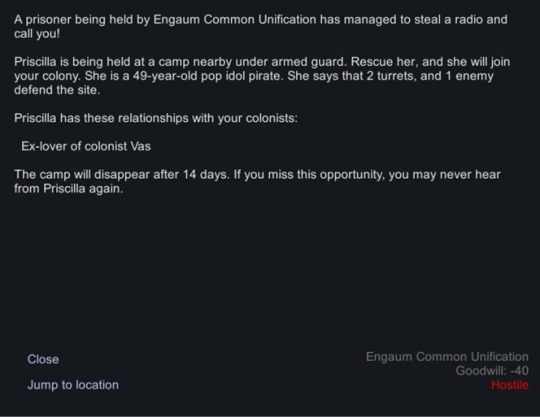
After rescuing Lucya’s ex-husband Vladimir it seems that everybody’s exes are getting in contact! There’s only one enemy, but two turrets. At least there are no mechanoids this time, though...
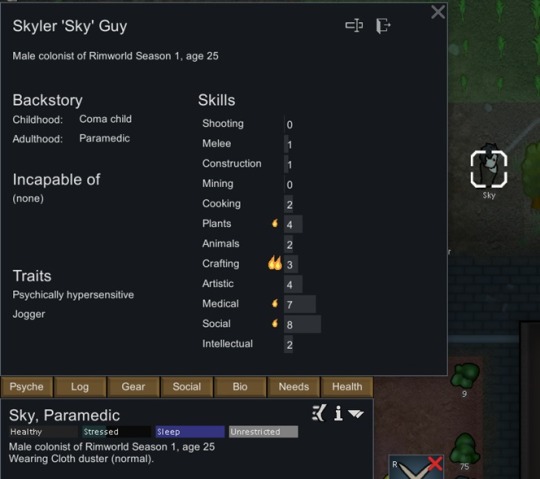
A prisoner has chosen to join! Sky is a fairly young local and it’s useful to have another medic and farmer.
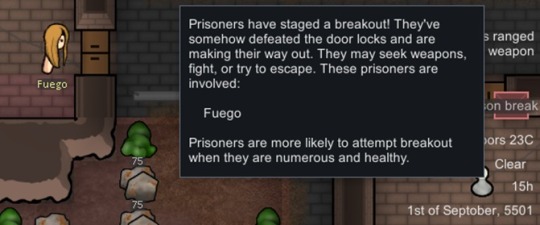
His former prison-mate is not so pleased, perhaps realising it’s only a matter of time before they are won over too...

The cruel woman goes after the first thing she sees - beating up the poor heavily-pregnant alpaca! Everyone else jumps in to defend it, so she won’t be able to hurt the alpaca any further.
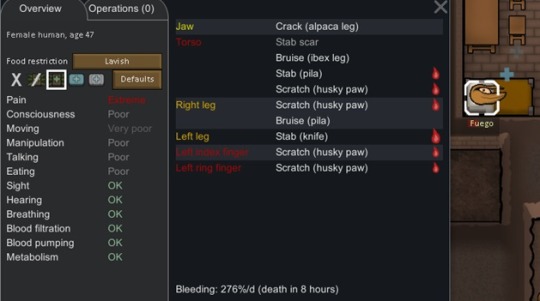
She’s quickly put down and back in the prison, where Henry will tend to her shortly I’m sure.

It seems the colonists have decided to bring some democracy to the proceedings! Both candidates are from our original three, so they’ll retain control of the colony either way.
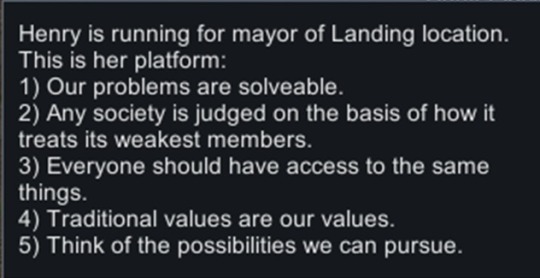
We even have their platforms! Henry seems to be appealing to equality, which is surprising given her misandrist tendencies - at least she’s not trying to put all the women above all the men...
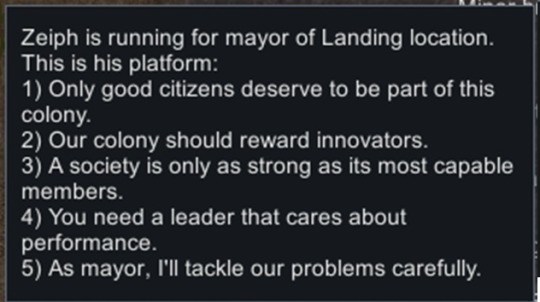
Zeiph, meanwhile, seems to be very outcome-oriented. We wonder what he means by ‘good’ citizens - morally? Skilled? Some of the colonists might be alarmed if he means the latter... It’ll be interesting to see who they all vote for!

Speaking of dubious colonists, this might be the last time Beryl collapses from a combination of being stoned and withdrawal symptoms - it looks as though he may finally be breaking from his addiction, and may become a much better worker for it, perhaps in time for a scary Mayor Zeiph.

An intriguing trade offer has come through for the colonists! They have a lot of materials with which they could craft the requested goods if they want to, so that should not be a problem. Nobody actually needs a new eye at present, but given some of the wounds so far and how good it sounds to be, it seems likely they will take up the offer anyway.
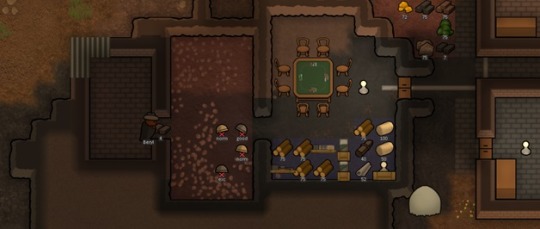
They were already struggling for storage space, so the colonists mine further into the mountain to create more. We have heard that there can be dangerous rooms in mountains, but the one they’ve discovered here seems to be empty and safe for use.
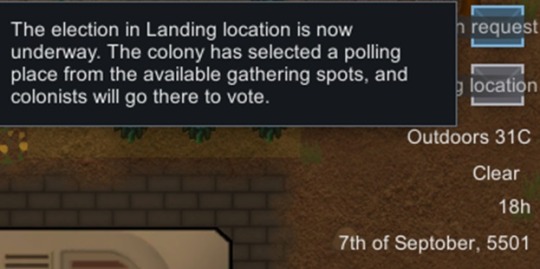
7th of Septober and the voting begins! We know Henry is always prone to anxiety, but perhaps even Zeiph is right now... Also it’s only mid-Spring, but it’s already heating up a lot at the colony. They’ll have to invest in cooling systems once again.
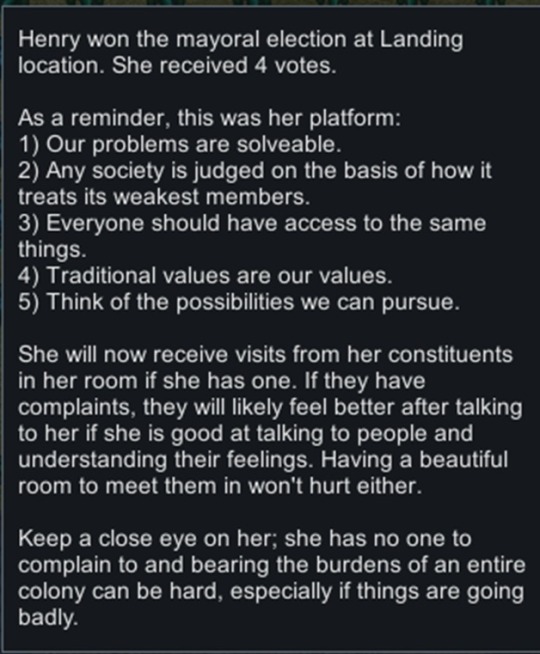
And Henry has won the very first election of the colony and of our show! I’m frankly not surprised; it sounded as though Zeiph might have wanted to kick some people out if he had won. Hopefully she can take the pressure on top of her anxiety...
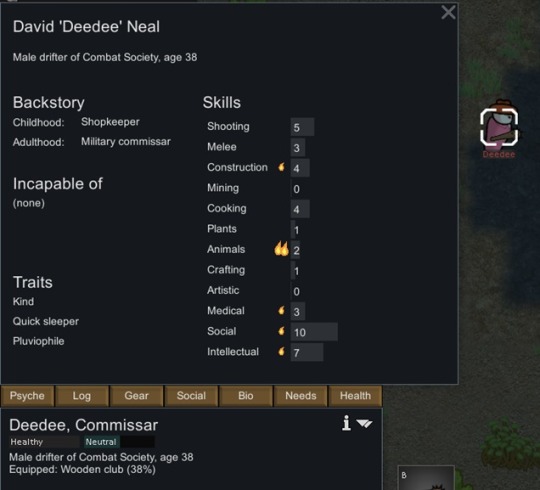
Her reign’s not off to the best start though - the same night a couple of raiders have shown up! This man doesn’t appear to be very well equipped or skilled...

This one is better equipped but not that well skilled either. Hopefully the people who are still awake can handle it without waking everybody...
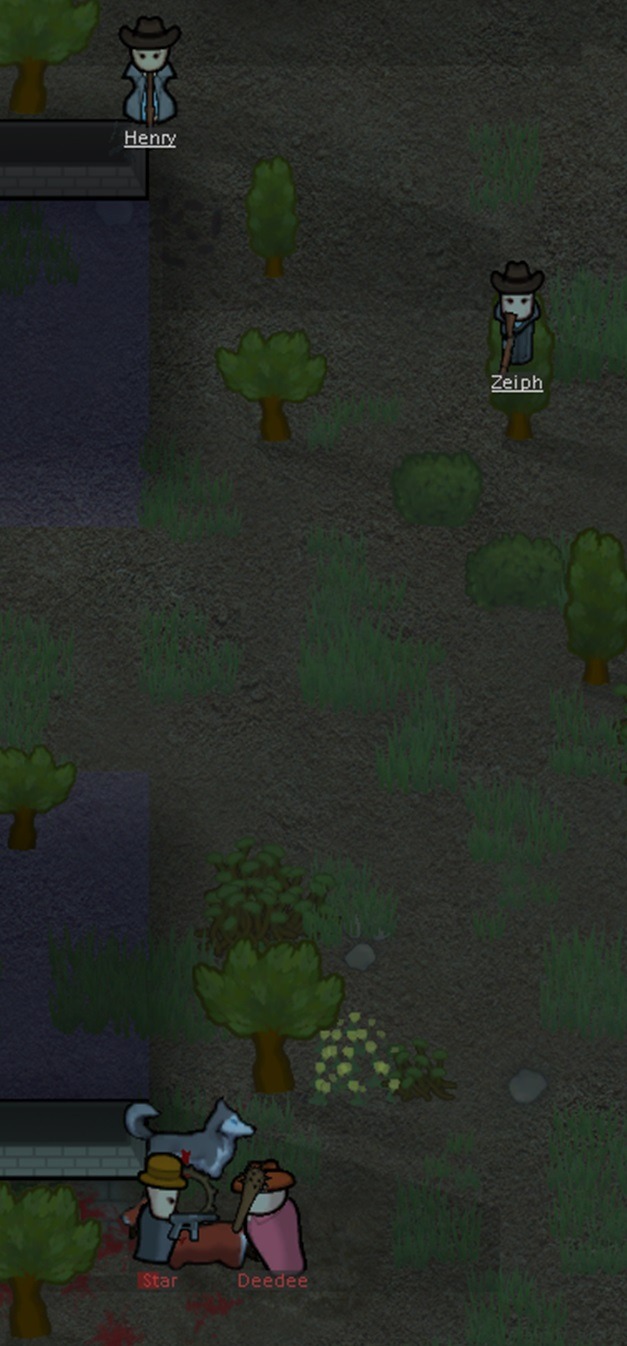
Henry and Zeiph were still around from the voting, so they and Henry’s more aggressive animals come out to fight, perhaps still wanting to prove themselves to their fellow colonists.
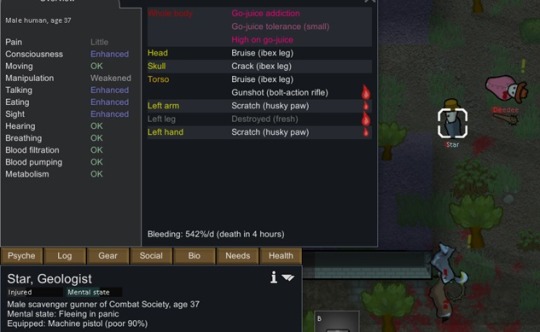
Both animals are downed, but both men are badly hurt without getting close to Henry or Zeiph as yet. This one appears to be trying to flee, but he’s not going to get far bleeding that badly...
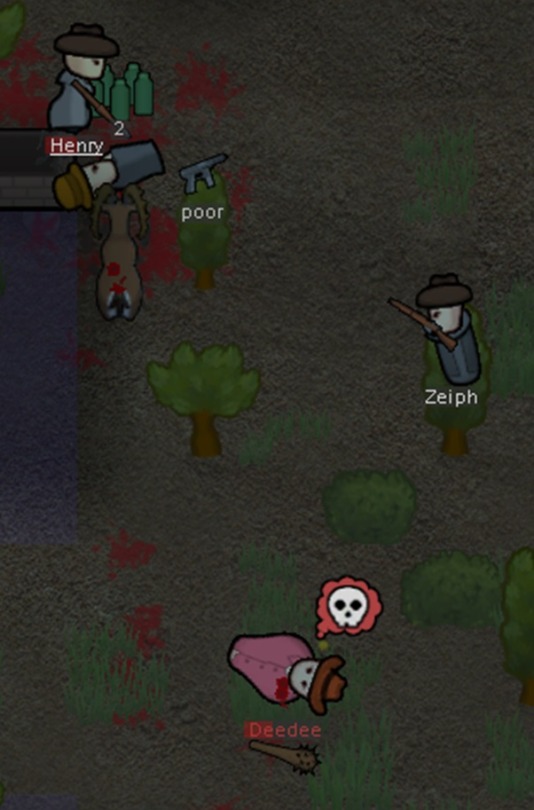
Instead he winds up going for Henry directly, and dying for his troubles. Hopefully the other raider will think twice before trying anything now.

With the raiders killed or captured, it’s tending time. Poor Jethro has now lost a leg to match his tail! He should still be able to walk to a degree, but it must be a struggle.
Just a quick reminder that Henry did sign the waiver for herself and her dog, so we cannot be sued for anything that happens to either of them!
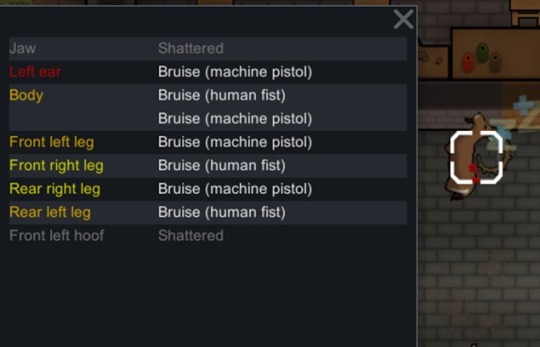
The ibex ram got battered again (it must be very tenderised at this rate), but should recover from the bruising fine given time.
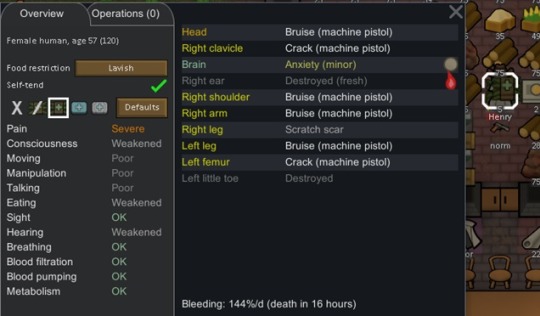
It’s not just the animals though! Henry’s copied Dead and gotten her right ear destroyed! Shame it’s not a bionic ear they’re hoping to pick up! Hopefully this won’t affect her ability to listen to her constituents too much!
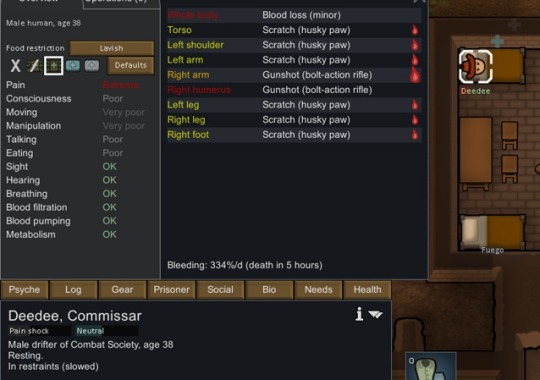
But the worst was suffered by the raiders. This one’s lucky the colonists have such skilled medics to hand, or he’d bleed out very quickly.
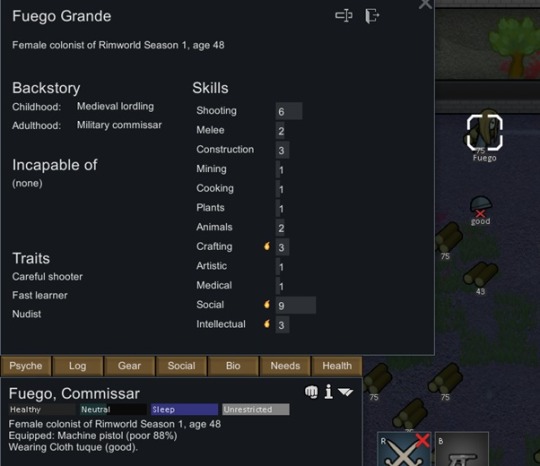
Perhaps she just didn’t want to share a prison again, but we have a tenth colonist as the other prisoner has chosen to join! She’s not very skilled, and I’m not about to forget the time she beat up the pregnant alpaca, but the colony does need more people if it is to send people out on trades and requests.

Speaking of requests, with this extra colonist on hand, it has been decided to try and rescue Vas’ ex-girlfriend. Vas, Vladimir and Beryl are all brawlers so were probably itching for the chance to smash some enemies, and Fuego has the sole gun for range.

So they set out west, across the rivers and plains, to their destination.

Whilst they are on their way, the alpaca manages to safely give birth to another female alpaca, seemingly unaffected by the beating its mother received earlier.
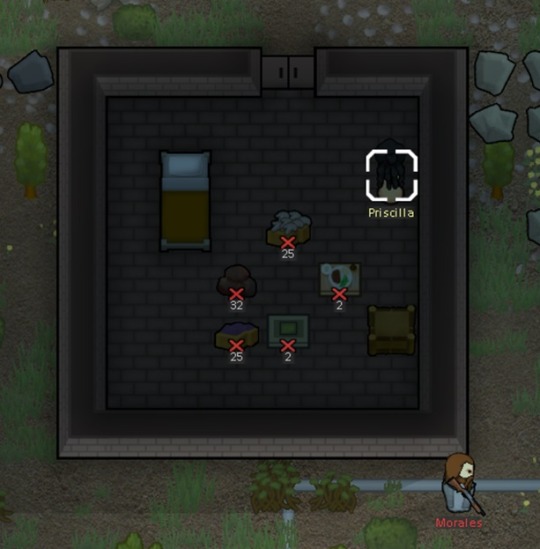
The travellers arrive at their location and we can see our first glimpse of Priscilla, and the one guardsman on patrol. We’re more worried about the turrets, however...
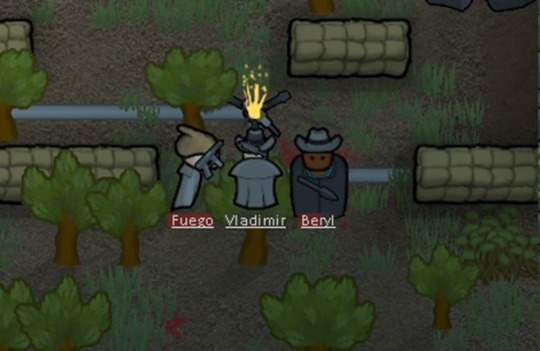
The plan was for the brawlers to go in and take the turret down while Fuego shot from a distance- But wait! What’s Fuego doing there instead of Vas? And what’s that hissing sound?
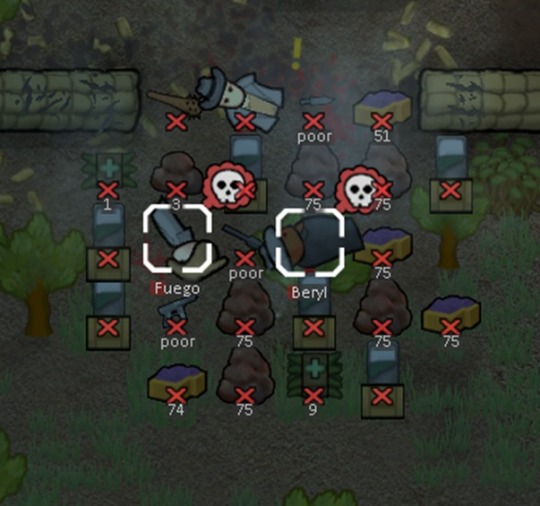
The damaged turret exploded! And Vladimir is dead instantly! It looked like all three of them tried to run, but none of them got far and Vladimir has been especially slow since his psychite withdrawal kicked in, so he got almost nowehere. Beryl and Fuego are still alive, but badly hurt...!
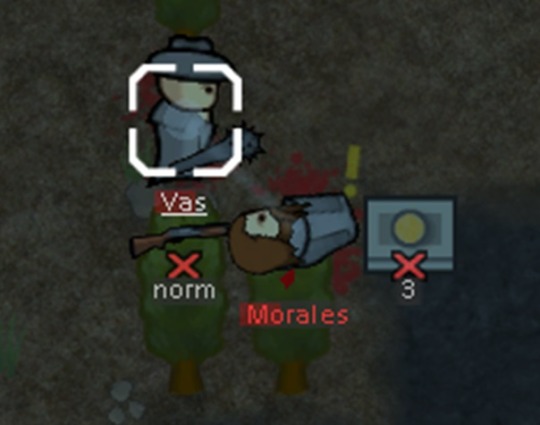
Of course all the commotion had the guard come running, but Vas is able to make short work of him so he can focus on his fellow colonists...
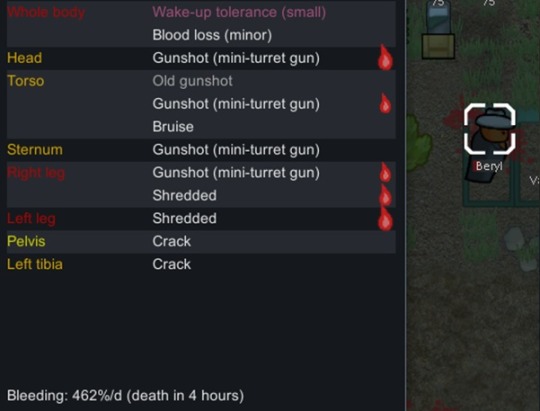
Poor Beryl, not long since his withdrawal symptoms wore off, now he’s had shots to his head and torso, and both legs shredded - he needs medical attention and fast!
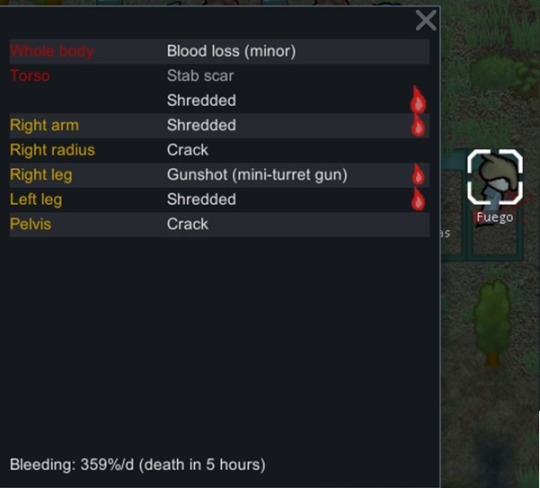
And Fuego’s not much better off, with her torso, leg and arm all shredded too. She won’t last long without help...
Of course, the colonists weren’t so foolish to leave the colony without some herbal medicine - except the only medics who came were Vladimir and Fuego herself! Vas is unable to help them at all, and it’s too far back to the base!
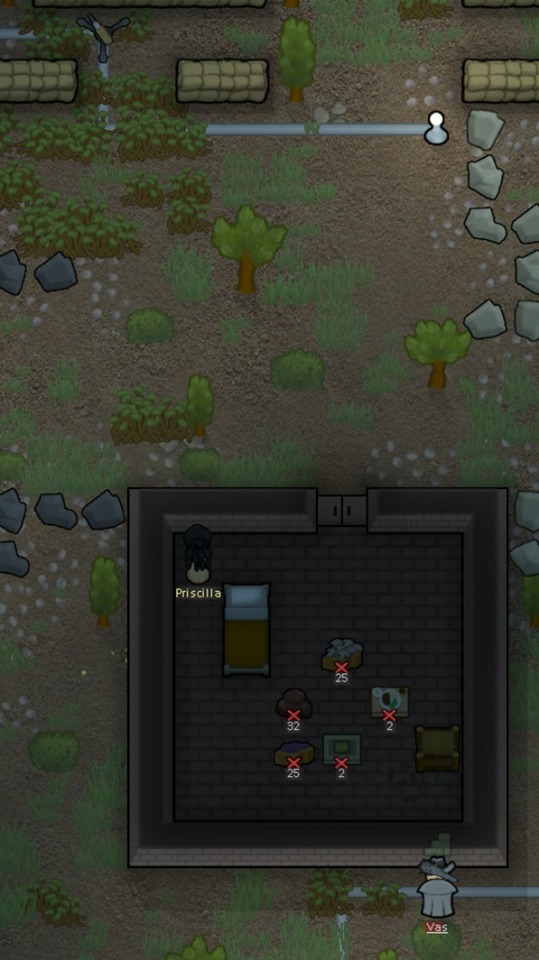
In desperation, Vas tries to batter the wall away from the remaining turret, to free his ex and hopefully get help for his friends!
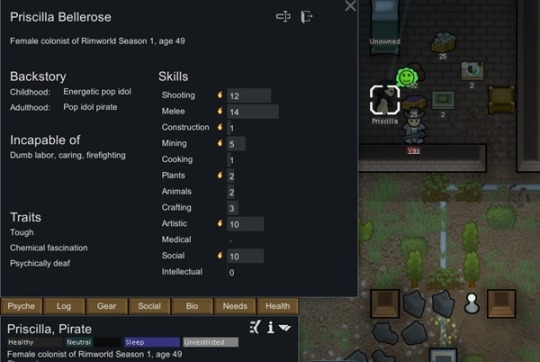
He gets through in time and she gratefully joins the colony- But the one thing she cannot do, for all her skills and interests, is medicine! Is there nothing they can do for Beryl and Fuego?!
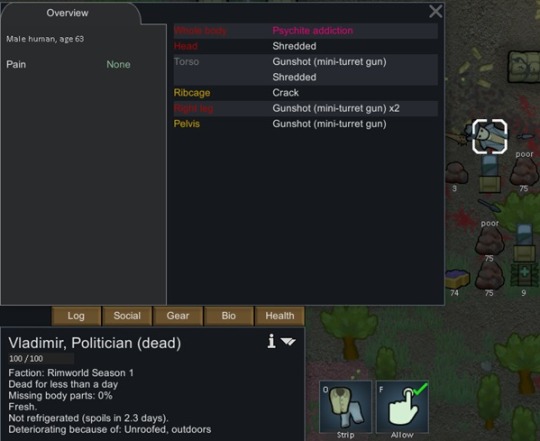
There is certainly nothing to be done for Vladimir. It seems that the explosion shredded his head and torso, killing him instantly. Perhaps Lucya will be relieved? Who knows...
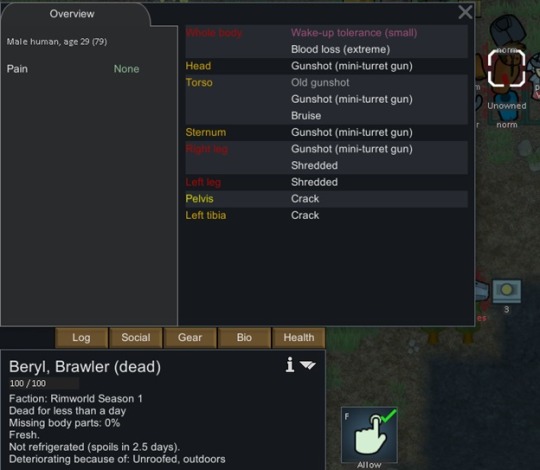
Beryl bleeds out first, as expected, probably the saddest loss of the trio.
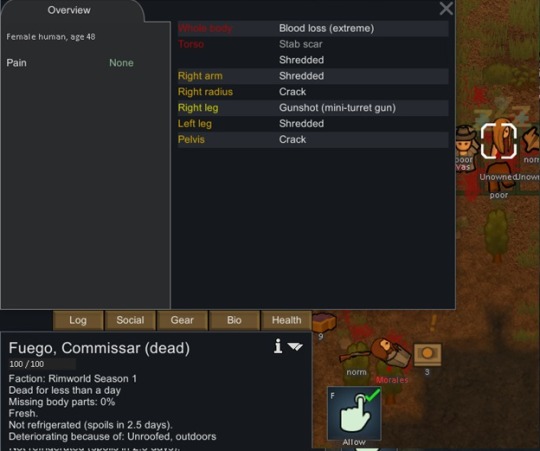
And then Fuego. For all that some danger must have been anticipated, this must be much worse than anticipated. Their first turret, they didn’t realise it would explode! Next time ranged weapons, it seems.
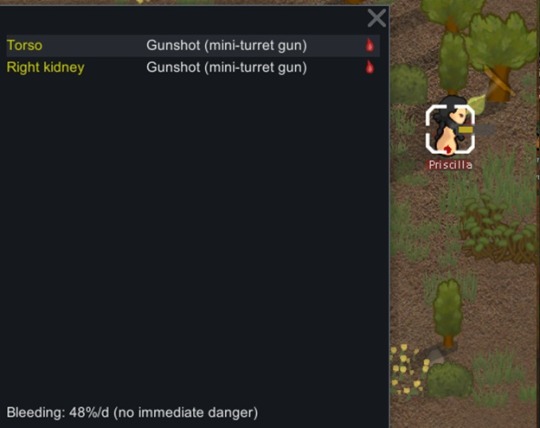
Meanwhile Priscilla’s not even being careful, wandering into the remaining turret’s zone! She’ll be lucky not to get infected when there’s no medic around. Still, they have subdue the guard, so they’re fixing the hole in the wall to keep him in until they can leave. They could kill him, of course, but they could use new recruits at this rate...
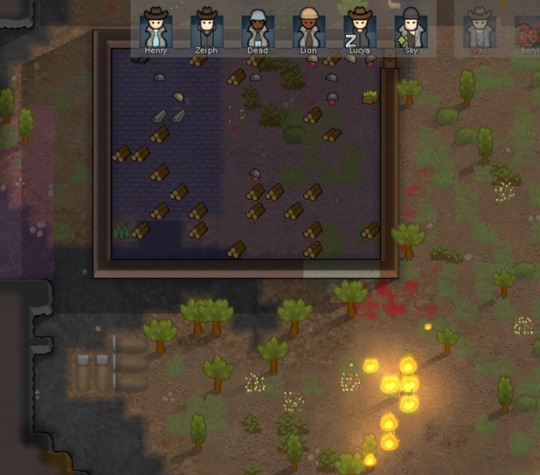
And while all this has been going on, a dry thunderstorm has caused fires near the home base, getting close to a new storage room that still has a wooden wall! It hardly compares to the massacre elsewhere though, even if it would be annoying to lose some of the new tuques Zeiph is making.
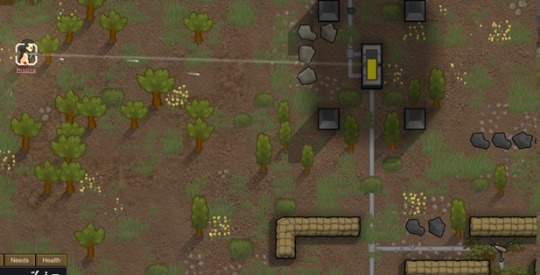
Frustratingly, the one gun’s range isn’t quite far enough for Priscilla to destroy the battrey to the remaining turret without letting it shoot her. Hopefully she can manage it before she joins the rest of the dead colonists...!
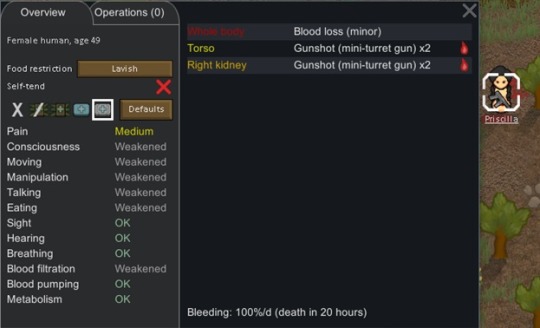
She manages it, but not without shots to her torso and kidney! 20 hours isn’t enough to get back to the main base and they still have no medic here, so they’re just going to have to try to pack up and pray that the bleeding dies down enough for her to make it, or Vas will be returning alone with the guard he didn’t even come for.
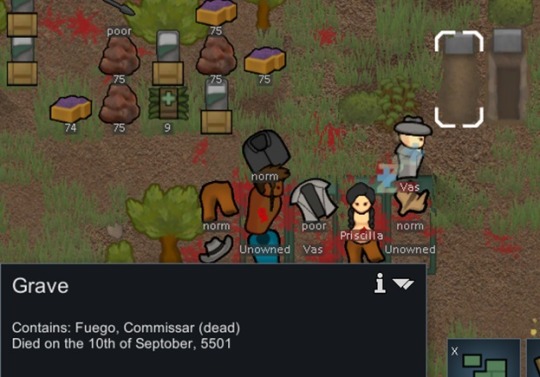
It seems that without animals, only one prisoner and one colonist badly wounded, the party simply doesn’t have the strength to carry the bodies home. Not all of them, for sure, and not any if they want to also carry enough food to get home too, so the deceased are going to have to be buried here instead.
I am only reluctantly giving Fuego a montage, I’m not convinced she deserves it after beating up that pregnant alpaca for no good reason, and she was barely a colonist anyway. Also, if she had stuck to the plan and sniped from a distance, maybe none (or less) of this would have happened.
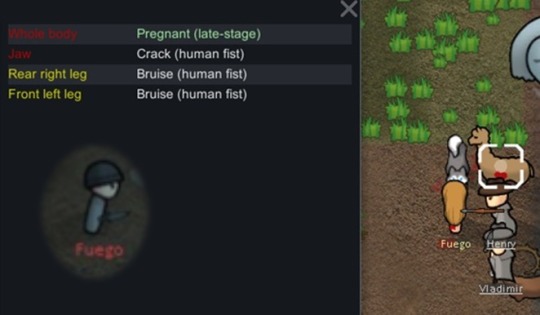
*Vaguely sad and very half-hearted unlicensed music plays*
The colonists came across Fuego Grande keeping Vladimir hostage, kicked her ass and took her prisoner.
She did eventually decide to join, but not before trying to break out and beating up a pregnant alpaca along the way. No I will not let this go.

She might have had promise if she had stuck with ranged attacks instead of trying to melee, but instead she’s dead.
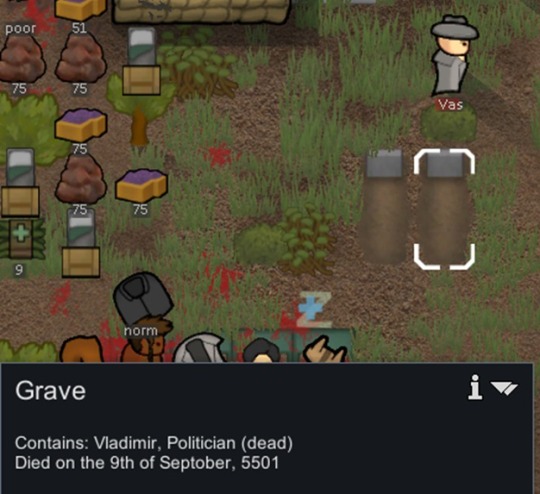
On to the other deceased members: we didn’t really get to know Vladimir much, but we’ll give him a montage anyway.
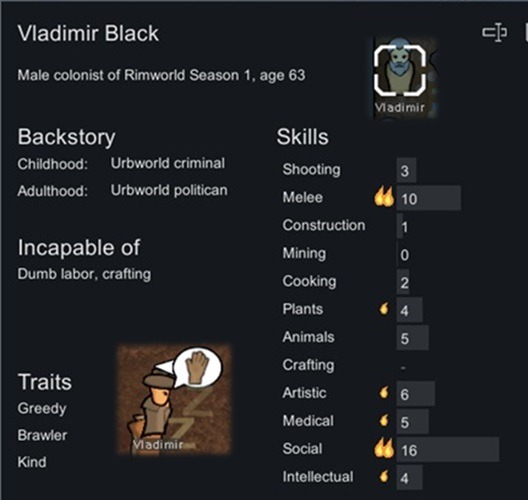
*Generic unlicensed sad music plays*
Vladimir Black, 63 years old. There are still so many unanswered questions. What was an urbworld politician doing in this backwater planet? What happened between him and Lucya to break them up? Why would you ever shave off that magnificent beard? Maybe Lucya knows, but she’s not talking and now he can’t either.
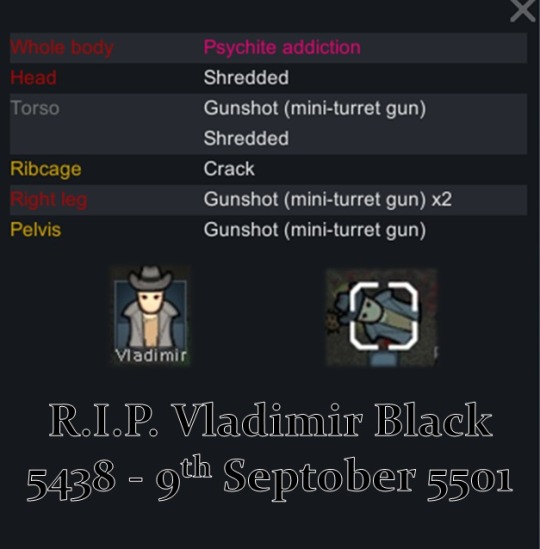
We can’t say for certain that Vladimir was a ‘good’ man, but he had his skills, got on with people for the short while he was a colonist, and despite his psychite withdrawal he never broke down and took it out on anybody, which is better than many could do.
I’m not sure that he’ll be missed, but he at least had a good run.
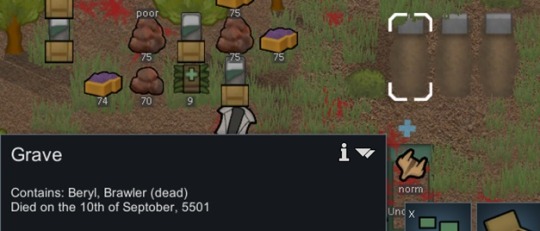
This is the saddest case, and the one that the colonists would have wanted back most of all, but food is more important to save those who are still alive, and Beryl’s not alone here.
Get some better sad music!

*Some genuinely quite sad and still unlicensed music plays*
Joel ‘Beryl’ Gemhunter made it nearly a year as a colonist after being rescued. It wasn’t always easy, and he struggled for a lot of that time with withdrawal symptoms from his Wake-Up addiction, but he kept trying.

He may have been 78 chronologically, but his 29 actual years showed in his behaviour. He wasn’t good at much, but he put all his effort into the things he did, helping to fearlessly take down the mechanoid, taming animals... getting stoned.
It’s a real shame that he died so soon after getting clean, with all his future ahead of him, he could have continued being a good defender of the colony.

I still don’t know if Gemhunter is a real name, but we’ll let him keep it in his grave. May he toke away* as much as he wants in the afterlife.
*Again our network must confirm that we do not endorse drug use. If you or any of your loved ones have issues with Wake-Up, Psychite or Smokeleaf, please speak to your doctor.

Anyway, with everyone buried, the two remaining colonists start back with their prisoner, despite Priscilla gradually bleeding out from her wounds. I don’t think she’ll merit a montage if she dies on the way; everyone’s just seen the entirety of her time with the colonists! She’d never have even seen the home base!
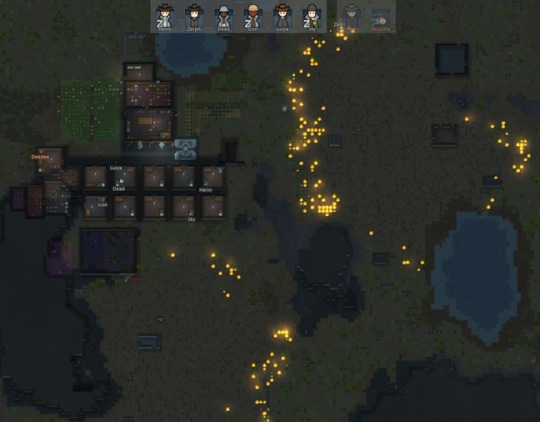
Speaking of the home base, all the forests have been burning down while we have been distracted.
Fortunately, nearly as soon as we paid attention to them again, it started raining, saving the fields and the new half-wooden storage room.

We can’t get visuals on the travellers, but we can get some vital health details - while Priscilla is still barely conscious, it looks like she may have stopped bleeding? I don’t want to speak too soon, but if the men can help or carry her on, she may survive...!

In clearer good news, the pregnant muffalo safely gave birth to another female muffalo. Makes you wonder what the colonists’ plans are for moving on from their current site, with the increasing number of pack animals...
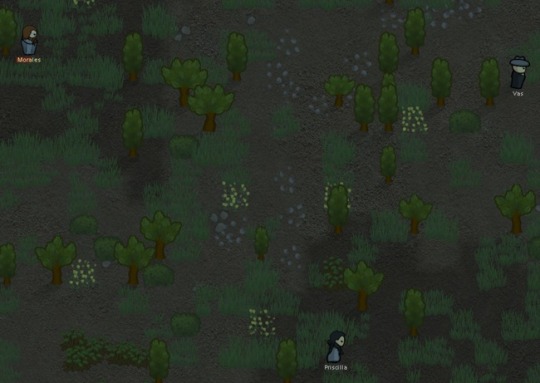
The travellers arrive back safely, and it appears that Vas and Priscilla are in good health now too! The prisoner still looks quite battered, but at least there are medics to hand now.

Vas and Priscilla barely get to sleep and they’re sent out again! Zeiph had filled the order of tuques and Vas and Priscilla are used to travelling, so they’re sent off to make the delivery. Presumably they aren’t too awkward despite their ex-lover status?
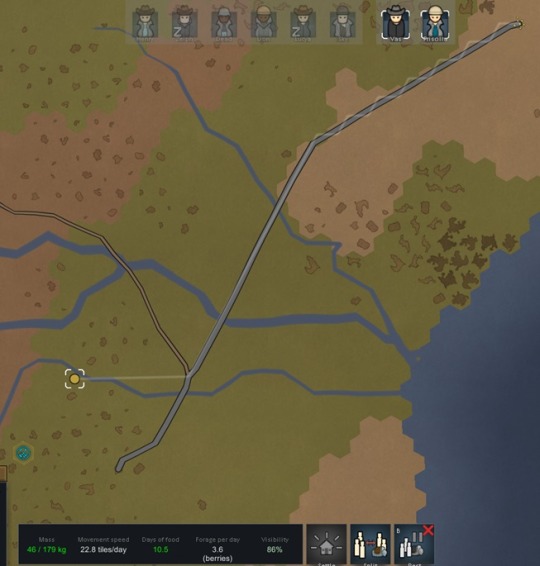
It’s a long journey though, much further in distance than the one they just made, though at least they have a clear road to follow. It will probably be the next quadrum before they return. Hopefully they won’t drive each other mad!

I feel like they’ve had quite enough drama for this quadrum, but it seems bad influence and ex-raider Deedee has persuaded still-injured Morales to break out with him. I don’t reckon their chances...
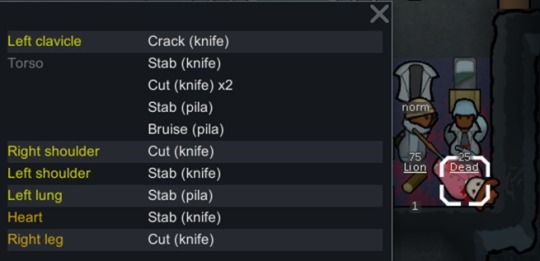
No, not the best idea he had there. I’m not convinced they’ll ever win over any of the pirate faction, they all seem like pretty bad eggs. Foolish ones too - if he’d just run for it he might have outpaced them, but for some reason he ducked into the mountain and then tried to bash his way out through a wall using a log. Strange man.
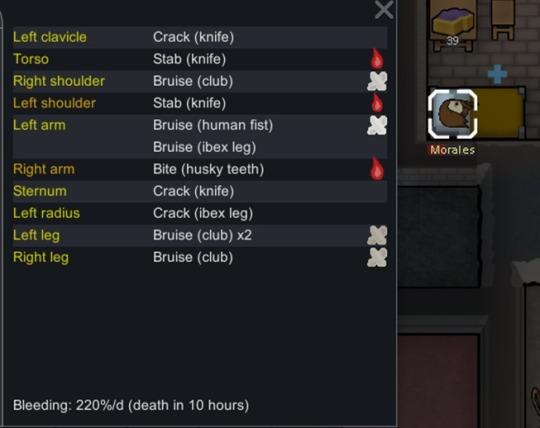
Morales should have stayed in bed, but I’m sure Henry will be back along again shortly to fix him up again. Man needs to learn to resist peer pressure, though perhaps that would make him harder to win over for the colony too.
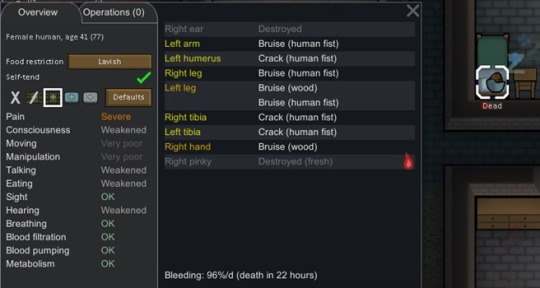
Oh! Surprisingly, it seems the pirate managed to destroy one of Dead’s fingers, presumably with that log, must have been a lucky shot!

Away from the action for a moment, Vas and Priscilla managed the journey and trade and have started on their way back, but definitely won’t be in time for the end of the quadrum, so we’ll have to have a look at them and their new item another time!
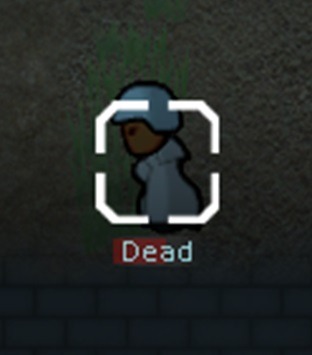
But just before the quadrum ends, Dead has her first mental breakdown, wandering around apathetically. Losing an ear wasn’t enough, but perhaps a finger as well, and all the people who have died lately, has made her realise what she’s gotten into. This is not an easy challenge, folks! We have literally seen people die, if not our original colonists! Dead probably ought to consider herself lucky that her name is not also a description, but perhaps that is what is weighing on her, when that will happen...
Who knows? We’ll just have to keep watching!
Final stats:
Henry: Lost an ear, but now mayor!
Jethro: Lost a leg :(
Zeiph: Lost an election
Dead: Lost a finger
Ibex ram: Beaten up again
Lion: Incredibly fine, as usual
Beryl: Dead :(
Lucya: Minus an ex-husband, maybe for the best?
Vladimir: Dead...
Vas: Took some shots and forced to spend time with an ex-girlfriend, but alright
Sky: Recruited, doing alright
Fuego: Recruited, dead.
Priscilla: Recruited, got a bullet wound scar on her kidney, but alive
Other animals: one poor alpaca beaten up, but a muffalo and an alpaca born
Colony: Went up to ten people, lost three, gained one, now at eight again (and one prisoner). 1 husky, 1 ibex ram, 3 muffalo and 3 alpacas.
2 notes
·
View notes
Link
The Mayor’s House Was Bombed. The Message: Keep Our Town Nuclear-Free. SUTTSU, Japan — It seemed like easy money. The Japanese government was conducting a study of potential locations for storing spent nuclear fuel — a review of old geological maps and research papers about local plate tectonics. It put out a call for localities to volunteer. Participating would commit them to nothing. Haruo Kataoka, the mayor of an ailing fishing town on the northern island of Hokkaido, put up his hand. His town, Suttsu, could use the money. What could go wrong? The answer, he quickly learned, was a lot. A resident threw a firebomb at his home. Others threatened to recall the town council. A former prime minister traveled six hours from Tokyo to denounce the plan. The town, which spends much of the year in a snowbound hush, was enveloped in a media storm. There are few places on earth eager to host a nuclear waste dump. Only Finland and Sweden have settled on permanent repositories for the dregs of their atomic energy programs. But the furor in Suttsu speaks to the deep anxiety that remains in Japan 10 years after an immense earthquake and tsunami caused the meltdown of three nuclear reactors in Fukushima Prefecture, the world’s worst nuclear disaster since Chernobyl. The black mark left on Japan’s nuclear industry has profound implications for the country’s ability to power the world’s third-largest economy while also meeting its obligations to combat climate change. Of Japan’s more than 50 nuclear reactors, all of which were shut down after the disaster on March 11, 2011, only nine have restarted, and the issue continues to be politically toxic. As the share of nuclear energy in Japan has plummeted from about a third of total power to the single digits, the void has been filled in part by coal and natural gas, complicating a promise that the country made late last year to be carbon-neutral by 2050. Even before the Fukushima calamity, which led to three explosions and a release of radiation that forced the evacuation of 150,000 people, ambivalence toward nuclear energy was deeply ingrained in Japan. The country is haunted by the hundreds of thousands killed by the atomic bombings of Hiroshima and Nagasaki at the end of World War II. Still, most Japanese had come to terms with nuclear power, viewing it as an inevitable part of the energy mix for a resource-poor country that must import about 90 percent of the materials it needs to generate electricity. After the nuclear disaster, public opinion swung decisively in the other direction. On top of a newly galvanized anxiety came a fresh mistrust of both the nuclear industry, which had built reactors susceptible to being overwhelmed in a natural disaster, and the government, which had allowed it to happen. A parliamentary commission found that the meltdowns had been the result of a lack of oversight and of collusion between the government, the plant’s owner and regulators. “Utilities and the government and us nuclear experts kept saying, ‘don’t worry, there won’t be a serious accident,’” said Tatsujiro Suzuki, director of the Research Center for Nuclear Weapons Abolition at Nagasaki University. Now “people think that the industry is not trustworthy and the government that is pushing the industry is not trustworthy.” The Japanese government, which has increased safety standards for nuclear power plants, says it plans to bring more reactors back online. But Fukushima’s legacy now taints all discussions about nuclear power, even the question of how to handle waste produced long before the disaster. “Every normal person in town is thinking about it,” said Toshihiko Yoshino, 61, the owner of a seafood business and oyster shack in Suttsu, who has become the face of the opposition to the mayor. “It’s because that kind of tragedy happened that we shouldn’t have nuclear waste here,” Mr. Yoshino said in an interview at his restaurant, where large picture windows look out onto the snow-swept mountains rising above Suttsu Bay. For now, the politics surrounding the waste indicate that, if it is not entombed beneath Suttsu, it will find its way to a place much like it: a town worn down by the collapse of local industry and the steady attrition of its population from migration and old age. The central government has tried to incentivize local governments to volunteer for consideration by offering a payment of around $18 million for taking the first step, a literature review. Those that go on to the second stage — a geological study — will receive an additional $64.4 million. Only one other town in the entire nation, neighboring Kamoenai — already next to a nuclear power plant — joined Suttsu in volunteering. One thing Fukushima has made clear, said Hirokazu Miyazaki, a professor of anthropology at Northwestern University who has studied how communities were compensated after the disaster, is the need to find an equitable way of distributing the social and economic costs of nuclear power. The problem is symbolized both by Fukushima’s partly uninhabitable towns and a battle over the government’s plan to release a million tons of treated radioactive water from the site into the ocean. The government says it would make small releases over 30 years with no impact on human health. Fishermen in Fukushima say that the plan would wreck their long journey toward recovery. “We have this potentially dangerous technology and we still rely on it and we need to have a long-range view on nuclear waste and decommissioning, so we better think about a much more democratic way to handle the cost associated with it,” Mr. Miyazaki said in an interview. Critics of nuclear power in Japan frequently point to the decades of failure to find a solution to the waste problem as an argument against restarting the country’s existing reactors, much less building new ones. In November, former Prime Minister Junichiro Koizumi took his campaign against nuclear energy to Suttsu at the invitation of local activists. Speaking in the town’s gymnasium, he said that after visiting Finland’s underground waste storage site — a facility much like the one proposed by the Japanese government — he had decided that Japan’s active geology would make it impossible to find a workable location. Japanese reactors have generated more than 18,000 tons of spent fuel over the last half century. A small proportion of that has been turned into glass — through a process known as vitrification — and sheathed in giant metal canisters. Almost 2,500 of the huge radioactive tubes are sitting in temporary facilities in Aomori and Ibaraki Prefectures, waiting to be lowered 1,000 feet beneath the earth’s surface into vast underground vaults. There, they would spend millenniums shedding their toxic burden. It will be decades — if ever — before a site is selected and the project begins in earnest. The Nuclear Waste Management Organization of Japan, known as NUMO and represented by a cartoon mole cautiously sticking its snout out of a hole, is in charge of finding a final resting place. Long before he took NUMO up on its offer to conduct a study in his town, Mr. Kataoka, the Suttsu mayor, had taken an entrepreneurial view toward government subsidies. Suttsu has a population of just under 2,900, spread thinly around the rocky rim of a deep cerulean bay, where fishing boats prowl for mackerel and squid. Beginning in 1999, with government-supported loans, Mr. Kataoka championed an initiative to install a stand of towering wind turbines along the shore. Many in the town were initially opposed, he said during an interview in his office, but the project has delivered handsome returns. The town has spent the profits from selling electricity to pay off debts. Townspeople have free access to a heated pool, a golf course and a modest ski slope with a rope tow. Next to a sleek community center is a free day care for the few residents with children. The facilities are not unusual for small-town Japan. Many localities have tried to stave off decline by spending large sums on white elephant projects. In Suttsu, the effect has been limited. The town is shrinking, and in early March, snow was piled to the eaves of newly built but shuttered stores along the main street. Mr. Kataoka nominated Suttsu for the NUMO program, he said, out of a sense of responsibility to the nation. The subsidies, he admitted, are a nice bonus. But many in Suttsu doubt the intentions of both Mr. Kataoka and the government. The town, they argue, does not need the money. And they question why he made the decision without public consultation. At a meeting of the town council on Monday, residents expressed concern that once the process had begun, it would quickly gather momentum and become impossible to stop. The plan has fiercely divided the town. Reporters have flooded in, putting the discord on national display. A sign in the hotel by the harbor makes it clear that the staff will not accept interviews. In October, an angry resident threw a Molotov cocktail at Mr. Kataoka’s home. It broke a window, but he smothered it without any further damage. The perpetrator was arrested and is now out on bail. He has apologized, Mr. Kataoka said. The mayor remains bewildered by the aggressive response. Mr. Katatoka insists that the literature review is not a fait accompli and that the townspeople will have the final say. In October, he will run for a sixth term. He wants voters to support his proposal, but whatever the outcome, he hopes the town can move forward together. Losing the election would be bad, he said, but “the saddest part of all this has been losing the town’s trust.” Motoko Richcontributed reporting from Tokyo. Source link Orbem News #Bombed #House #mayors #message #NuclearFree #Town
0 notes
Text
Jobless Claims in the U.S. Set to Rise
Right Now
Futures markets were predicting Wall Street would fall nearly 2 percent when trading starts.
New jobless claims are expected to reflect continuing layoffs, even as reopening proceeds.
Another huge weekly batch of new unemployment claims is expected to be reported on Thursday by the Labor Department.
Economists surveyed by Bloomberg estimated that 1.6 million people filed initial claims for state unemployment insurance last week. That would continue the decline from the more than six million claims seen in a single week in March, but would still be an unusually high number.
More than 40 million state claims have been filed since the coronavirus pandemic caused a widespread shutdown of businesses, and 21.5 million jobless workers were collecting state benefits in the previous weekly report. Some of those ineligible for state benefits, like the self-employed, are getting aid under an emergency federal program.
“We’re slowly seeing the labor market recovery begin to take form,” said Robert Rosener, an economist at Morgan Stanley, but “there’s still an enormous amount of layoffs going on.”
The government reported last week that jobs rebounded last month and that the unemployment rate fell unexpectedly to 13.3 percent. Correcting for a classification error, the rate was closer to 16.4 percent.
Reopening efforts will quickly reinstate a third of the workers who lost their jobs, said Beth Ann Bovino, the chief U.S. economist at S&P Global, but a return to the labor market conditions that preceded the pandemic is unlikely before 2023.
“We’re expecting a long haul,” she said.
U.S. stock futures fall amid a spate of glum forecasts.
U.S. stock futures tumbled on Thursday, following major European markets lower, after a spate of negative forecasts about the global recovery and signs that coronavirus cases continue to climb around the world.
Futures that track U.S. stocks were predicting Wall Street would open about 1.5 percent lower. Shares of airlines, hotels and other companies that have rallied recently on optimism over the reopening of pandemic lockdowns traded lower. Oil fell about 4 percent. Stocks in London, Paris and Frankfurt were all between 2 and 3 percent lower. Earlier in the day markets in Japan and Australia fell by roughly 2 percent.
Investors were bracing for another weekly jobless claims report in the United States, which is expected to show more that about 1.6 million state claims were filed last week. They were also reacting to the Federal Reserve’s forecast on Wednesday that the unemployment rate could stay high for the next several years. Earlier that day, the Organization for Economic Cooperation and Development warned in a report that the world economy is facing the most severe recession in a century and could experience a halting recovery.
The forecasts highlight the possibility of a second wave of infections that could hit the world’s major economies as they emerge from efforts to stop their first outbreaks. The global outlook could remain unsteady until vaccines become widely available.
China pushes for more street vendors, suggesting its recovery may not be all it seems.
Image
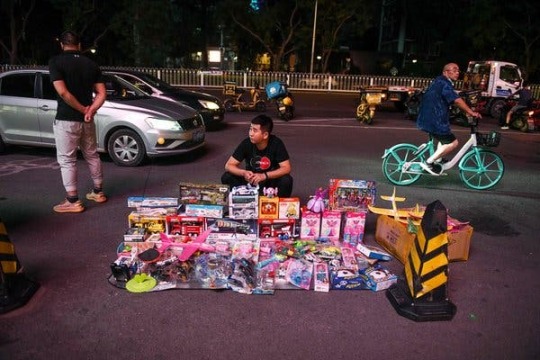
A street vendor selling toys in Beijing on Wednesday.Credit…Greg Baker/Agence France-Presse — Getty Images
Xie Yiyi, who is American-educated, lost her job last Friday, making the 22-year-old Beijing resident one of millions of young people in China left unmoored and shaken by the coronavirus.
So that same day, heeding the advice of one of China’s top leaders, she decided to open a barbecue stall.
Street vendors are seen by many Chinese people as embarrassing eyesores from the country’s past, when it was still emerging from extreme poverty. In many Chinese cities, uniformed neighborhood rules enforcers called chengguan regularly evict and assault sidewalk sellers of fake jewelry, cheap clothes and spicy snacks.
But Li Keqiang, China’s premier, had publicly called for the country’s jobless to ignite a “stall economy” to get the country’s derailed economy back on track. In the process, he laid bare China’s diverging narratives after the coronavirus epidemic. Is China an increasingly middle-class country, represented by the skyscrapers and tech campuses in Beijing, Shanghai and Shenzhen? Or is much of it still poor and backward, a country of roadside stalls in back alleys?
Mr. Li’s comments defied the Communist Party’s usual narrative of untrammeled prosperity, which helped legitimize its rule.
Cities rushed to lure vendors to the streets. A few even set recruiting quotas for the chengguan, meaning that the people who once harassed and beat vendors now had to support them. An economist estimated that 50 million jobs could be created if the government gave more space to the vendors and farmers selling their produce.
But then a backlash began, and the state media began reining in the enthusiasm. “The stall economy isn’t appropriate for first-tier cities,” said China Central Television, the state broadcaster, referring to relatively wealthy cities like Beijing and Shanghai. Allowing the stall economy to make a comeback in those cities is “equivalent of going backward in decades overnight,” it wrote. “It’s a departure from high-quality growth.”
As energy prices tumble, some developing countries trim subsidies.
Image
Filling up in October in Quito, Ecuador, where the government slashed fuel subsidies to save $1.4 billion a year, then reversed course.Credit…Ivan Alvarado/Reuters
The coronavirus pandemic has sent economies into recession and reduced government revenue, so some countries are taking a politically perilous path: removing restraints on electricity and petroleum prices.
Nigeria and Tunisia have lowered fuel subsidies in recent weeks, and India has raised taxes on gasoline and diesel fuel. Sudanese officials plan to replace some subsidies with direct cash payments to the poor. Venezuela, where the economy was collapsing before the pandemic, has partly reversed decades of gasoline subsidies. And the state-owned electric utility in Dubai is seeking to raise rates for the first time in a generation.
In contrast to the recent past, elected leaders are facing little political blowback for taking away subsidies and raising taxes. That’s because the prices of oil, natural gas and other fuels have collapsed in recent months. In addition, driving, flying and industrial activity have dropped off sharply.
But that could change once world energy prices shake off the pandemic’s effects. Energy subsidies are often taken for granted outside the halls of power. But they constitute vital policy choices that weigh on government budgets and economic development.
“Governments are caught in a dilemma,” said Jim Krane, an energy expert at Rice University who has studied subsidies. “Do they want to protect the poor who may have lost their jobs and incomes, or do they want to take action against the pernicious long-term cost to their budgets?”
European food delivery service to buy Grubhub.
Image
The all-stock deal for Grubhub would give Just Eat Takeaway a foothold in the United States.Credit…Gabriela Bhaskar for The New York Times
Just Eat Takeaway said on Wednesday that it had agreed to buy Grubhub for $7.3 billion, a deal that would give the European company a foothold in the United States.
Uber had been in talks to buy Grubhub, but those discussions foundered over price and regulatory concerns, said people with knowledge of the discussions, who were not authorized to speak publicly.
Food delivery has become more popular during the coronavirus pandemic. But profits in the food delivery business have been elusive. Uber Eats, DoorDash and Grubhub have all spent millions of dollars on marketing and incentives to lure customers away from the others. Grubhub, which had been profitable, began losing money as it spent more to fight off rivals. And restaurants have complained about the fees and tactics of those companies.
In the all-stock deal, Just Eat Takeaway said it would value Grubhub at $75.15 per share, a 27 percent premium to Grubhub’s closing price of $59.05. Grubhub’s founder and chief executive, Matt Maloney, will join Just Eat Takeaway’s board and oversee its business in North America, the companies said.
Just Eat Takeaway was created this year through the $7.8 billion combination of two of the earliest participants in Europe’s food-delivery market, Just Eat and Takeaway.com. It has been fighting competition in Europe from Uber Eats and Deliveroo, a London-based company whose investors include Amazon.
Catch up: Here’s what else is happening.
Rose Marcario, the chief executive of Patagonia for 12 years, is stepping down effective June 12, the outdoors brand said on Wednesday evening. It did not give a reason for her departure. Patagonia’s sales have dropped 50 percent in North America because of the coronavirus pandemic. The company’s transition will be led by Doug Freeman, its chief operating officer.
Disneyland in Anaheim, Calif., will reopen on a limited basis on July 17, the theme park’s 65th anniversary, the Walt Disney Company said on Wednesday. California Adventure, an adjacent Disney property, will also reopen on that date. A phased reopening of Disney’s hotels in Anaheim will follow on July 23. The plans must still be approved by state and local health officials. Disney World is scheduled to begin reopening on July 11. Disney parks in France, Japan and Hong Kong remain closed.
Los Angeles County issued guidelines for film and television to begin production as early as Friday, but it’s more likely that production will not resume until July at the earliest. Studios and production companies are still waiting for unions to determine job protocols, even though the industry issued its own white paper last week that established general guidelines for resuming production.
Reporting was contributed by Clifford Krauss, Li Yuan, Mohammed Hadi, Kate Conger, Adam Satariano, Michael J. de la Merced, Brooks Barnes, Tiffany Hsu, Carlos Tejada and Nicole Sperling.
Read More
from Job Search Tips https://jobsearchtips.net/jobless-claims-in-the-u-s-set-to-rise/
0 notes
Link
One September weekend in 1995, a few thousand people met at a convention center in Seattle to prepare for an apocalyptic standoff with the federal government. At the expo, you could sign up to defend yourself from the coming “political and economic collapse,” stock up on beef jerky, learn strategies for tax evasion, and browse titles by writers like Eustace Mullins, whose White nationalist classics include The Secrets of the Federal Reserve, published in 1952, and—from 1967—The Biological Jew.
The sixth annual Preparedness Expo made national papers that year because it served as a clearinghouse for the militia movement, a decentralized right-wing movement of armed, local, anti-government paramilitaries that had recently sparked its most notorious act of terror, the bombing of the Oklahoma City federal courthouse by White nationalists Timothy McVeigh and Terry Nichols. A series of speakers told expo attendees the real story: the attack had been perpetrated by the government itself as an excuse to take citizens’ guns away.
Not a lot of Black folks show up at gatherings like the Preparedness Expo, one site in an extensive right-wing counterculture in which White nationalism is a constant, explosive presence. White nationalists argue that Whites are a biologically defined people and that, once the White revolutionary spirit awakens, they will take down the federal government, remove people of color, and build a state (maybe or maybe not still called the United States of America, depending on who you ask) of their own. As a Black man, I am regarded by White nationalists as a subhuman, dangerous beast. In the 1990s, I was the field organizer for the Northwest Coalition Against Malicious Harassment, a six-state coalition working to reduce hate crimes and violence in the Pacific Northwest and Mountain States region. We did a lot of primary research, often undercover. A cardinal rule of organizing is that you can’t ask people to do anything you haven’t done yourself; so I spent that weekend as I spent many—among people plotting to remove me from their ethnostate.
It helped that, despite its blood-curdling anti-Black racism, at least some factions of the White nationalist movement saw me as a potential ally against their true archenemy. At the expo that year, a guy warily asked me about myself. I told him that I had come on behalf of a few brothers in the city. We needed to resist the federal government and we were there to get educated. I said I hoped he wouldn’t take it personally, but I didn’t shake hands with White people. He smiled; he totally understood. “Brother McLamb,” he concurred, “says we have to start building broad coalitions.” Together we went to hear Jack McLamb, a retired Phoenix cop who ran an organization called Police Against the New World Order, make a case for temporary alliances with “the Blacks, the Mexicans, the Orientals” against the real enemy, the federal government controlled by an international conspiracy. He didn’t have to say who ran this conspiracy because it was obvious to all in attendance. And despite the widespread tendency to dismiss antisemitism, notwithstanding its daily presence across the country and the world, it is obvious to you, too.
From the time I documented my first White nationalist rally in 1990 until today, the movement has made its way from the margins of American political life to its center, and I’ve moved from doing antiracist organizing in small northwestern communities to fighting for inclusive democracy on a national level, as the Gender, Racial, and Ethnic Justice program officer at the Ford Foundation until recently, and now as a senior fellow at the Southern Poverty Law Center. Yet if I had to give a basic definition of the movement—something I’ve often been asked to do, formally and informally, by folks who’ve spent less time hanging out with Nazis than I have—my response today would not be much different than it was when I began to do this work nearly thirty years ago. American White nationalism, which emerged in the wake of the 1960s civil rights struggle and descends from White supremacism, is a revolutionary social movement committed to building a Whites-only nation, and antisemitism forms its theoretical core.
...The meteoric rise of White nationalism within national discourse over the course of Donald Trump’s presidential campaign and freshman administration—through Trump’s barely coded speech at fascist-style rallies, his support from the internet-based “Alt Right,” and his placement of White nationalist popularizers in top positions—has produced a shock of revelation for people across a wide swath of the political spectrum. This shock, in turn, has been a source of frustration within communities of color and leftist circles, where White liberals are often accused of having kept their heads in the sand while more vulnerable populations sounded the alarm about the toll of economic crisis, mass incarceration, police violence, deportation, environmental devastation, and—despite and in reaction to the election of Barack Obama—the unending blare of everyday hate. This is an understandable reaction. It’s one I’ve often shared. But the fact that many of us have long recognized that the country we live in is not the one we are told exists doesn’t mean we always understand the one that does. Within social and economic justice movements committed to equality, we have not yet collectively come to terms with the centrality of antisemitism to White nationalist ideology, and until we do we will fail to understand this virulent form of racism rapidly growing in the U.S. today.
To recognize that antisemitism is not a sideshow to racism within White nationalist thought is important for at least two reasons. First, it allows us to identify the fuel that White nationalist ideology uses to power its anti-Black racism, its contempt for other people of color, and its xenophobia—as well as the misogyny and other forms of hatred it holds dear. White nationalists in the United States perceive the country as having plunged into unending crisis since the social ruptures of the 1960s supposedly dispossessed White people of their very nation. The successes of the civil rights movement created a terrible problem for White supremacist ideology. White supremacism—inscribed de jure by the Jim Crow regime and upheld de facto outside the South—had been the law of the land, and a Black-led social movement had toppled the political regime that supported it. How could a race of inferiors have unseated this power structure through organizing alone? For that matter, how could feminists and LGBTQ people have upended traditional gender relations, leftists mounted a challenge to global capitalism, Muslims won billions of converts to Islam? How do you explain the boundary-crossing allure of hip hop? The election of a Black president? Some secret cabal, some mythological power, must be manipulating the social order behind the scenes. This diabolical evil must control television, banking, entertainment, education, and even Washington, D.C. It must be brainwashing White people, rendering them racially unconscious.
What is this arch-nemesis of the White race, whose machinations have prevented the natural and inevitable imposition of white supremacy? It is, of course, the Jews. Jews function for today’s White nationalists as they often have for antisemites through the centuries: as the demons stirring an otherwise changing and heterogeneous pot of lesser evils. At the turn of the twentieth century, “The Protocols of the Learned Elders of Zion”—a forgery, first circulated by Czarist secret police in Russia in 1903, that purports to represent the minutes of a meeting of the international Jewish conspiracy—established the blueprint of antisemitic ideology in its modern form. It did this by recasting the shape-shifting, money-grubbing caricature of the Jew from a religious caricature to a racialized one. Upper-class Jews in Europe might have been assimilating and changing their names, but under the new regime of antisemitic thought, even a Jew who converted to Christianity would still be a Jew.
In 1920, Henry Ford brought the “Protocols” to the United States, printing half a million copies of an adaptation called “The International Jew,” and the text has had a presence in American life ever since. (Walmart stocked copies on its shelves and for a time refused calls to take them down—in 2004.) But it is over the past fifty years, not coincidentally the first period in U.S. history in which most American Jews have regarded themselves as White, that antisemitism has become integral to the architecture of American racism. Because modern antisemitic ideology traffics in fantasies of invisible power, it thrives precisely when its target would seem to be least vulnerable. Thus, in places where Jews were most assimilated—France at the time of the Dreyfus affair, Germany before Hitler came to power—they have functioned as a magic bullet to account for unaccountable contradictions at moments of national crisis. White supremacism through the collapse of Jim Crow was a conservative movement centered on a state-sanctioned anti-Blackness that sought to maintain a racist status quo. The White nationalist movement that evolved from it in the 1970s was a revolutionary movement that saw itself as the vanguard of a new, whites-only state. This latter movement, then and now, positions Jews as the absolute other, the driving force of white dispossession—which means the other channels of its hatred cannot be intercepted without directly taking on antisemitism.
This brings me to the second reason that White nationalist antisemitism must not be dismissed: at the bedrock of the movement is an explicit claim that Jews are a race of their own, and that their ostensible position as White folks in the U.S. represents the greatest trick the devil ever played. ... Contemporary antisemitism, then, does not just enable racism, it also is racism, for in the White nationalist imaginary Jews are a race—the race—that presents an existential threat to Whiteness. Moreover, if antisemitism exists in glaring form at the extreme edge of political discourse, it does not exist in a vacuum; as with every form of hateful ideology, what is explicit on the margins is implicit in the center, in ways we have not yet begun to unpack.
...What I learned when I got to Oregon, as I began to log untold hours trying to understand White nationalists and their ideas, was that antisemitism was the lynchpin of the White nationalist belief system. That within this ideological matrix, Jews—despite and indeed because of the fact that they often read as White—are a different, unassimilable, enemy race that must be exposed, defeated, and ultimately eliminated. Antisemitism, I discovered, is a particular and potent form of racism so central to White supremacy that Black people would not win our freedom without tearing it down.
...The White nationalist movement that emerged in the last decades of the twentieth century grew across the country. But it was Oregon, Washington, Idaho, Montana, and Wyoming that neonazis in the 1980s carved out as the territorial boundaries of their future Whites-only state, a region that self-identified “Aryans” from around the country began to colonize with nothing short of White national sovereignty as their goal. “Ourselves alone willing,” declared White nationalist leader and Aryan Nations organizer Robert Miles, “we shall begin to form the new nation even while in the suffocating embrace of the ZOG.” In White nationalist parlance, the United States is the ZOG, or Zionist Occupied Government. It was in the Northwest that the nascent militia movement—notorious in the 1990s after standoffs between White nationalist compounds and the FBI in Ruby Ridge, Idaho and Waco, Texas—declared war on their country loudly enough they could no longer be ignored.
...When folks ask me, skeptically, where the antisemitism in the White nationalist movement lies, it can feel like being asked to point out a large elephant in a small room. From the outset of my research on White nationalism all those years ago, it was clear that antisemitism in the movement is everywhere, and it is not hidden. “Life is uglier and uglier these days, more and more Jewish,” William Pierce wrote in The Turner Diaries. “No matter how long it takes us and no matter to what lengths we must go, we’ll demand a final settlement of the account between our two races,” the narrator promises at the book’s conclusion. “If the Organization survives this contest, no Jew will—anywhere. We’ll go to the uttermost ends of the earth to hunt down the last of Satan’s spawn.” White nationalism is a fractious countercultural social movement, and its factions often disagree with each other about basic questions of theory and practice. The movement does not take a single, unified position on the Jewish question. But antisemitism has been a throughline from the Posse Comitatus, which set itself against “anti-Christ Jewry”; to David Duke’s refurbished Ku Klux Klan, which abandoned anti-Catholicism in the 1970s in order to focus on “Jewish supremacism”; to the neonazi group The Order, inspired by The Turner Diaries, which in the mid-1980s went on a rampage of robberies and synagogue bombings in Washington state and murdered a Jewish radio talk show host in Denver; to evangelical leaders like Pat Robertson who denounced antisemitism but used its popularity among their followers to promote an implicitly White supremacist “Christian nationalism”; to the contemporary Alt Right named by White nationalist Richard Spencer, which has brought antisemitic thought and imagery to new audiences on the internet—and now at White House press conferences.
...Over years of speaking about White nationalism in the 1990s and early 2000s in the Northwest and then the Midwest and South, I found that audiences—whether white or of color, at synagogues or churches, universities or police trainings—generally had a relationship to white nationalism that, at least in one basic sense, was like my own. They knew the scope and seriousness of the movement from personal experience, and—if they didn’t take this for granted to begin with—they were not shocked to discover its antisemitic emphasis. The resistance I have encountered when I address antisemitism has primarily come since I moved to the Northeast seven years ago, and from the most established progressive antiracist leaders, organizations, coalitions, and foundations around the country. It is here that a well-meaning but counterproductive thicket of discourse has grown up insisting that Jews—of Ashkenazi descent, at least—are uncontestably White, and that to challenge this is to deny the workings of White privilege. In other words, when I’m asked, “Where is the antisemitism?,” what I am often really being asked is, “Why should we be talking about antisemitism?”
...I can answer this question as I have been doing and will continue to do: antisemitism fuels White nationalism, a genocidal movement now enthroned in the highest seats of American power, and fighting antisemitism cuts off that fuel for the sake of all marginalized communities under siege from the Trump regime and the social movement that helped raise it up. To refuse to deal with any ideology of domination, moreover, is to abet it. Contemporary social justice movements are quite clear that to refuse antiracism is an act of racism; to refuse feminism is an act of sexism. To refuse opposition to antisemitism, likewise, is an act of antisemitism. Arguably, not much more should need to be said than that. But I suspect that much more does need to be said. To the hovering question, why should we be talking about antisemitism, I reply, what is it we are afraid we will find out if we do? What historic and contemporary conflicts will be laid bare? And if we recognize that White privilege really is privilege, what will it mean for Jewish antiracists to give up the fantasy that they ever really had it to begin with?
...A central insistence of antiracist thought over the past several decades is that, as with any social category produced by regimes of power, you don’t choose race, power chooses it for you; it names you. This is why all the well-meaning identification in the world does not make a White person Black. Likewise, as much as I draw inspiration from the Jewish community, and as much as I adore my Jewish partner and friends, it was my organizing against antisemitism as a Black antiracist that first pulled me to the Jewish community, not the other way around. I developed an analysis of antisemitism because I wanted to smash White supremacy; because I wanted to be free. If we acknowledge that White nationalism clearly and forcefully names Jews as non-white, and did so in the very fiber of its emergence as a post-civil rights right-wing revolutionary movement, then we are forced to recognize our own ignorance about the country we thought we lived in. It is time to have that conversation.
Read Eric K. Ward’s full article at Political Research Associates. It is long but amazing and important.
128 notes
·
View notes
Photo

Europe in Irreversible Decay, EU Elections are Proof of It!
Europe, an “old” colonialist continent, is decaying, and in some places even collapsing. It senses how bad things are going. But it never thinks that it is its own fault.
North America is decaying as well, but there, people are not even used to comparing. They only “feel that things are not going well”. If everything else fails, they simply try to get some second or third job, and just survive, somehow.
On both sides of the Atlantic, the establishment is in panic. Their world is in crises, and the ‘crises’ arrived mainly because several great countries, including China, Russia, Iran, but also South Africa, Turkey, Venezuela, DPRK and the Philippines, are openly refusing to play in accordance with the script drawn in Washington, London and Paris. In these nations, there is suddenly no appetite for sacrificing their own people on the altar of well-being of Western citizens. Several countries, including Venezuela and Syria, are even willing to fight for their independence.
Despite insane and sadistic embargos and sanctions imposed on them by the West; China, Russia and Iran are now flourishing, in many fields doing much better than Europe and North America.
If they are really pushed any further, China, Russia and their allies combined, could easily collapse the economy of the United States; an economy which is built on clay and unserviceable debt. It is also becoming clear that militarily, the Pentagon could never defeat Beijing, Moscow, even Teheran.
After terrorizing the world for ages, the West is now almost finished: morally, economically, socially, and even militarily. It still plunders, but it has no plan to improve the state of the world. It cannot even think in such terms.
It hates China, and every other country that does have progressive, internationalist plans. It smears President Xi Jinping and his brainchild, the Belt and Road Initiative (BRI), but there is nothing new and exciting that the West is able to offer to the world. Yes, of course, those regime changes, coups, military interventions and theft of natural resources, but anything else? No, silence!
*
During my two weeks long working visit to Europe, in the Czech Republic (now renamed to Czechia), a country that enjoys a higher HDI (Human Development Index defined by UNDP) than Italy or Spain, I saw several young, decently dressed men, picking through garbage bins, right in front of my hotel, looking for food.
I saw young Europeans kneeling and begging in Stuttgart, the second richest city in Germany (where both Mercedes and Porsche car are produced).
What I observed in all seven countries of the EU that I visited, was confusion, but also indifference, extreme selfishness and almost grotesque idleness. In great contrast to Asia, everybody in Europe was obsessed with their ‘rights’ and privileges, while no one gave a slightest damn about responsibilities.
When my plane from Copenhagen landed in Stuttgart, it began to rain. It was not heavy rain; just rain. The Canadair jet operated by SAS is a small aircraft, and it did not get a gate. It parked a few meters from the terminal and the captain announced that ground staff refused to bring a bus, due to lightning and the downpour. And so, we stayed inside the plane, for 10 minutes, 20 minutes, half an hour. The lightning ended. The drizzle continued. 40 minutes, no bus. One hour later, a bus appeared. A man from the ground staff emerged leisurely, totally wrapped in plastic, protected hermetically from rain. Passengers, on the other hand, were not even offered umbrellas.
“I love myself”, I later read graffiti in the center of the city.
The graffiti was not far from the central train station, which is being refurbished at the cost of several billion euros, and against the will of the citizens. The monstrous project is marching on at an insanely lazy pace, with only 5-6 construction workers detectable at a time, down in the tremendous excavations.
Stuttgart is unbelievably filthy. Escalators often do not work, drunkards are all over, and so are beggars. It is as if for decades, no one did any face-lift to the city. Once free museums are charging hefty entrance fees, and most of the public benches have disappeared from parks and avenues.
The decay is omnipresent. The German rail system (DB) has virtually collapsed. Almost all trains are late, from the ‘regional’; to the once glorified ICE (these German ‘bullet trains’ are actually moving slower, on average, even in comparison to some Indonesian inter-city expresses).
The services provided everywhere in Europe, from Finland to Italy, are grotesquely bad. Convenience stores, cafes, hotels – all are understaffed, badly run and mostly arrogant. Humans are often replaced by dysfunctional machines. Tension is everywhere, the bad mood omnipresent. Demanding anything is unthinkable; one risks being snapped at, insulted, sent to hell.
I still remember how Western propaganda used to glorify services in the capitalist countries, when we were growing up in the Communist East: “The customer is always treated like a god”. Yes, right! How laughable.
For centuries, “European workers” were ‘subsidized’ by colonialist and neo-colonialist plunder, perpetrated in all non-white corners of the world. They ended up being spoiled, showered with benefits, and unproductive. That was fine for the elites: as long as the masses kept voting for the imperialist regime of the West.
“The Proletariat” eventually became right-wing, imperialist, even hedonistic.
I saw a lot this time, and soon I will write much more about it.
What I did not witness, was hope, or enthusiasm. There was no optimism. No healthy and productive exchange of ideas, or profound debate; something I am so used to in China, Russia or Venezuela, just confusion, apathy and decay everywhere.
And hate for those countries that are better, more human, more advanced, and full of socialist enthusiasm.
*
Italy felt slightly different. Again, I met great left-wing thinkers there; philosophers, professors, filmmakers, journalists. I spoke at Sapienza University, the biggest university in Europe. I lectured about Venezuela and Western imperialism. I worked with the Venezuelan embassy in Rome. All of that was fantastic and enlightening, but was this really Italy?
A day after I left Rome for Beirut, Italians went to the polls. And they withdrew their supports from my friends of the 5-Star-Movement, leaving them with just over 17%, while doubling the backing for the extreme right-wing Northern League.
This virtually happened all over Europe. UK Labor lost, while right-wing Brexit forces gained significantly. Extreme right-wing, even near-fascist parties, reached unexpected heights.
It was all “me, me, me” politics. An orgy of “political selfies”. Me had enough of immigrants. Me wants better benefits. Me wants better medical care, shorter working hours. And so on.
Who pays for it, no one in Europe seems to care. Not once did I hear any European politicians lamenting about the plundering of West Papua or Borneo, about Amazonia or the Middle East, let alone Africa.
And immigration? Did we hear anything about that nuisance of European refugees, millions of them, many illegal, that have descended in the last decades on Southeast Asia, East Africa, Latin America, and even Sub Continent? They are escaping, in hordes, from meaninglessness, depressions, existential emptiness. In the process, they are stripping the locals of land, real estate, beaches, everything.
“Immigrants out”? Fine; then European immigrants out from the rest of the world, too! Enough of the one-sidedness!
The recent EU elections clearly showed that Europe has not evolved. For countless dark centuries, it used to live only for its pleasure, murdering millions in order to support its high life.
Right now, it is trying to reshuffle its political and administrative system, so it can continue doing the same. More efficiently!
On top of it, absurdly, the world is expected to pity that overpaid and badly performing, mainly right-wing and lethargic European proletariat, and sacrifice further tens of millions of people, just in order to further increase its standard of living.
All this should not be allowed to happen. Never again! It has to be stopped.
What Europe has achieved so far, at the expense of billions of lives of “the others”, is definitely not worthy of dying for.
Beware of Europe and its people! Study its history. Study imperialism, colonialism and the genocides it has been spreading all over the world.
Let them vote in their fascists. But keep them away. Prevent them from spreading their poison all over the world.
They want to put the interests of their countries first? Wonderful! Let us do exactly the same: The people of Russia first, too! China first! And, Asia, Africa, Latin America first!
0 notes
Text
Wednesday, June 23, 2021
Mapping quest edges past 20% of global ocean floor
(BBC) The quest to compile the definitive map of Earth’s ocean floor has edged a little nearer to completion. Modern measurements of the depth and shape of the seabed now encompass 20.6% of the total area under water. It’s only a small increase from last year (19%); but like everyone else, the Nippon Foundation-GEBCO Seabed 2030 Project has had cope with a pandemic. The extra 1.6% is an expanse of ocean bottom that equated to about half the size of the United States. The achievement to date still leaves, of course, four-fifths of Earth’s oceans without a contemporary depth sounding.
Watchdog: Nursing home deaths up 32% in 2020 amid pandemic
(AP) Deaths among Medicare patients in nursing homes soared by 32% last year, with two devastating spikes eight months apart, a government watchdog reported Tuesday in the most comprehensive look yet at the ravages of COVID-19 among its most vulnerable victims. The report from the inspector general of the Department of Health and Human Services found that about 4 in 10 Medicare recipients in nursing homes had or likely had COVID-19 in 2020, and that deaths overall jumped by 169,291 from the previous year, before the coronavirus appeared. “We knew this was going to be bad, but I don’t think even those of us who work in this area thought it was going to be this bad,” said Harvard health policy professor David Grabowski, a nationally recognized expert on long-term care, who reviewed the report for The Associated Press. “This was not individuals who were going to die anyway,” Grabowski added. “We are talking about a really big number of excess deaths.”
Brazil passes half a million COVID-19 deaths, experts warn of worse ahead
(Reuters) Brazil’s death toll from COVID-19 surpassed 500,000 on Saturday as experts warn that the world’s second-deadliest outbreak may worsen. Only 11% of Brazilians have been fully vaccinated and epidemiologists warn that, with winter arriving in the southern hemisphere and new variants of the coronavirus circulating, deaths will continue to mount even if immunizations gain steam. Brazil has registered 500,800 deaths from 17,883,750 confirmed COVID-19 cases, according to Health Ministry data on Saturday, the worst official death toll outside the United States.
Spanish prime minister says Catalan separatists convicted of sedition will be pardoned
(Washington Post) Calling it a “huge step toward reconciliation,” Spanish Prime Minister Pedro Sánchez said his cabinet on Tuesday will approve pardons for nine separatists from Catalonia who were convicted of sedition for their role in a 2017 independence bid. The decision, opposed by a slight majority of Spaniards as well as the country’s Supreme Court, will mark the biggest political shift from the central government toward Catalonia since the chaotic referendum on independence four years ago. The move is aimed at defusing tensions in what has become Spain’s greatest political crisis since the transition to democracy after the death of dictator Francisco Franco in 1975. For some Catalans, the nine jailed leaders have become an emotional symbol for what they say is a right denied by Madrid to choose their region’s destiny. But it is unclear how dramatically the pardons will change the dynamic. Some pro-independence figures in Catalonia say the only proper peace offering is full amnesty—which would strike the crimes from the record, something that the pardons will not do.
Berlin expands bike lanes as COVID cycling boom continues
(Reuters) Berlin is making permanent the extra bike lanes it added during coronavirus lockdowns as it seeks to support the cycling boom that started in the pandemic. The German capital has marked about 25 km (15 miles) of extra "pop-up" bike lanes since COVID-19 hit in 2020 as commuters switched to cycling to avoid crowded public transport. Other European cities—like Paris and London—have also been adding bike paths. The German Cyclists Association (ADFC) says bike traffic rose by 25% in Berlin due to the temporary lanes and the pandemic.
Russians’ return boosts Turkish tourism prospects
(Reuters) Thousands of Russian tourists began arriving in Turkey on Tuesday, boosting hopes for its tourism sector after a two-month suspension in flights imposed by Moscow due to concerns about a surge in COVID-19 cases in April. Turkey’s tourism prospects have been revived by a sharp fall in daily coronavirus cases to around 5,000 from a peak of more than 60,000 two months ago, as well as an acceleration in vaccinations to more than 1 million a day. The first plane arrived in Antalya from Moscow around dawn, carrying 132 passengers. Some 12,000 Russians were expected to arrive on 44 planes in the Mediterranean tourist hub of Antalya on Tuesday, state-owned Anadolu news agency said.
Iran president-elect takes hard line, refuses to meet Biden
(AP) Iran’s president-elect staked out a hard-line position Monday in his first remarks since his landslide election victory, rejecting the possibility of meeting with President Joe Biden or negotiating Tehran’s ballistic missile program and support of regional militias. The comments by Ebrahim Raisi offered a blunt preview of how Iran might deal with the wider world in the next four years as it enters a new stage in negotiations to resurrect its now-tattered 2015 nuclear deal with global powers.
Hong Kong’s pro-democracy Apple Daily could shut under government pressure
(Washington Post) In the 26 years since its founding, Hong Kong’s Apple Daily newspaper has been unrestrained in its criticism of the Chinese Communist Party and unwavering in its support for the pro-democracy movement. It has survived multiple raids, boycott campaigns and the arrest of its founder, Jimmy Lai, under the draconian new national security law. But now with its assets frozen by the Hong Kong government, the Chinese-language Apple Daily could cease operations as soon as Friday. The news outlet is unable to pay staff members or vendors and will be forced to close if the government declines to release its funds—shuttering the territory’s largest independent newspaper. “It is more than surreal to see,” said Ed Chin, a hedge fund manager and longtime Apple Daily columnist. “These so-called executors of the national security law—they have lost it. They are destroying the autonomy of Hong Kong.” The fate of Apple Daily and its chief editor, top executives and founder Jimmy Lai—all either detained or arrested under the national security law and facing life in prison—are emblematic of the staggering changes underway in Hong Kong. Freedoms guaranteed in Hong Kong’s Basic Law, including freedom of speech and the press, have become secondary to Beijing’s will as it re-engineers the once-autonomous territory and uses the new law to force subservience.
Australia’s runaway mouse plague targets prisons, forcing mass evacuation
(Washington Post) Hundreds of prisoners at Wellington Correctional Center in Australia’s New South Wales state are being forced to move out of the facility as officials scramble to repair the damage caused by mice chomping through cables, scurrying across ceiling panels and embedding in the building’s walls. Corrective Services New South Wales Commissioner Peter Severin confirmed that “vital remediation work” needed to be carried out at the jail, which is located about four hours from Sydney, along with a thorough clean and review of the prison’s infrastructure. An estimated 420 male and female prisoners will be relocated over the next 10 days, along with at least 200 staff members. Pest control services have been summoned to remove the dead creatures from the walls, which authorities say is sending a potent stench into the air. Australia has a mouse problem. A plague, in fact. A mass invasion occurs every decade or so, wreaking havoc across communities and destroying the crops and stock of farmers who are worried about what the future holds for their livelihoods.
In times of crises, Lebanon's old must fend for themselves
(AP) Tiny and bowed by age, Marie Orfali makes the trip five times a week from her Beirut apartment to the local church, a charity and a nearby soup kitchen to fetch a cooked meal for her and her 84-year-old husband, Raymond. Their only support—Raymond’s $15,000 one-time end-of-service payment from when he retired more than 20 years ago—long ago ran dry. They have since depended on charity to cover almost everything: rent, cleaning supplies, pain killers and food for their white dog Snoopy. But charity covers less and less as Lebanon’s currency collapses. The cash they get from a benefactor and the church every month, once amounting to $400, is now barely worth $40. The 76-year-old Marie broke down in tears when asked how she’s doing. With virtually no national welfare system, Lebanon’s elderly are left to fend for themselves amid their country’s economic turmoil. In their prime years, they survived 15 years of civil war that started in 1975 and bouts of instability. Now, in their old age, many have been thrown into poverty by one of the world’s worst financial crises in the past 150 years. Lebanon has the greatest number of elderly in the Middle East—10% of the population of 6 million is over 65.
Palestinians, settlers clash in tense Jerusalem neighborhood
(AP) Palestinians and Jewish settlers hurled stones, chairs and fireworks at each other overnight in a tense Jerusalem neighborhood where settler groups are trying to evict several Palestinian families, officials said Tuesday. The threatened evictions fueled protests and clashes in the runup to last month’s 11-day Gaza war and pose a test for Israel’s new governing coalition, which includes three pro-settler parties but is hoping to sideline the Palestinian issue to avoid internal divisions. The Red Crescent emergency service said its crews treated 20 Palestinians, including 16 suffering from pepper spray and tear gas and others wounded by rubber-coated bullets. Two other people were wounded, including an elderly man who was hit in the head, it said. The eruption of violence is the latest friction in Sheikh Jarrah, where weeks of unrest captured international attention ahead of the 11-day Israel-Hamas war last month. The cease-fire took effect on May 21, but the long-running campaign by Jewish settlers to evict dozens of Palestinian families continues.
They disappeared after encounters with Nigeria’s security forces
(Washington Post) Her last sighting of her son was in a photo on social media. His eyes were shut. His face was covered in blood. He was dead. Now Ndifreke Ibanga is tormented by a recurring nightmare: her 26-year-old weeping. Victor’s soul will not rest, she worries, until his body is found. Victor is one of the hundreds of civilians who rights groups say are killed or disappear each year after encounters with Nigerian security forces—and one of more than a dozen still missing after a demonstration against police brutality in the city of Lagos in October. Some vanish after being taken into custody; others, like Victor, are presumed dead after public confrontations with police or soldiers. The families of victims are haunted by a singular question: What happened to their bodies? Local rights groups and international watchdogs have long accused Nigerian forces of carrying out extrajudicial killings and disappearing the corpses. Many are never found. But some are. Interviews with family members and friends of Nigerians who disappeared in similar circumstances shed light on a gruesome pattern: As a result of intense search efforts, or happenstance, or both, the bodies of their loved ones turned up at mortuaries and anatomy labs, nameless and without an easy explanation of how they arrived—or how they died.
0 notes
Text
Why Investors May Soon Be In For A Rude Awakening
BY PATRICK WATSON
It seems that a lot of people have missed the distinction between wishful thinking and reality lately—and I fear it’s going to hurt them badly.
After Donald Trump won in November, some Americans didn’t just hope for the best; they thought it was here.
The euphoria is visible in the Small Business Optimism Index.
(Source: NFIB)
Confidence spiked higher following the election because surely, people thought, an all-Republican White House and Congress would waste no time ushering in business-friendly policy changes.
While that was a reasonable conclusion, now it looks like small-business owners may have let their political excitement affect their common sense.
The jury isn’t in yet on how massive the changes are going to be. And the NFIB index hasn’t pulled back much, so respondents seem to be patient so far.
You could say the same for investors. Stock benchmarks rose after the election, particularly in regulated sectors like banking and energy, because investors believed policy changes would lead to higher earnings.
I was less confident, and said so in my December letter that we’ll get some tax cuts and deregulation. But they can’t possibly do as much as some people expect for 2017.
I’m still convinced that’s true—and the "rude awakening" may be even closer now.
Is the Economy a coiled spring like it was for Reagan?
In that same issue, I showed the following decision tree from one of Louis Gave’s epic Gavekal Research presentations. Even now, it’s still a good analytical guide:
Source: GavekalResearch
Answering two questions leads you to one of four scenarios, each with a different investment strategy.
Does the US economy have pent-up growth potential that a Trump presidency can unlock?
Will the Fed tighten monetary policy aggressively?
Let’s think about these in order.
If the US economy is a coiled spring ready to surge, it has a strange way of showing it. Even the most optimistic projections show real GDP growth for 2017 will be little better than last year’s disappointing 1.6%.
I think our economy is the opposite of a coiled spring.
It’s been stretched past its limits by debt. Aside from insane federal, state, and local government debt, we owe trillions more in credit card, auto, student loan, and mortgage loans. That stands in the way of any meaningful expansion.
But let’s suppose for the sake of argument the economy really wants to grow, and all it needs is a little nudge from the government. Are those policy changes right around the corner?
I don’t think so.
100 Days of Gridlock
The Trump administration’s first 100 days are running out, and we have yet to see any major legislation pass.
The Obamacare repeal/replace plan is still on the table but not doing well. The GOP is divided at least three ways. Compromises that would bring more conservatives aboard repel the moderates—and vice versa.
Plus, the healthcare reform bill wasn’t just healthcare. It would have eliminated the Obamacare taxes on higher-income Americans… and its Medicaid cuts were going to offset lower corporate tax rates in other legislation. Now that’s much harder.
Scratch healthcare and tax reform off the list.
Bank deregulation? That’s going nowhere. We hear talk about amending the Dodd-Frank Act, but nothing concrete is happening.
Worse, the Trump administration still hasn’t gained control of key regulatory agencies. As of now, the Securities and Exchange Commission (SEC) only has two commissioners. One is a Democrat. The Commodity Futures Trading Commission (CFTC) is similarly split.
Banks can’t count on much administrative relief until the president gets his people in control of the regulatory agencies—and that’s nowhere on the radar right now.
Infrastructure stimulus? It’s bogged down in a debate how to pay for it. Last week, Trump told the New York Times he would consider borrowing “much more” than $300 billion for infrastructure projects.
You can imagine how GOP deficit hawks loved that idea. It won’t mesh well with their desire to cut tax rates without adding more debt.
Trump has talked about making deals with Democrats if he can’t get enough Republican votes to pass his bills. But Democrats have little reason to cooperate. Their base voters are energized against Trump and won’t stand for it.
Bottom line:
Congress has no majority favoring any of the changes that made investors and business owners so optimistic after the election.
The Trump White House has a lot to do and is still trying to get organized.
Instead of a unified Republican government, we have near-total gridlock.
I think the answer to our first question, “Does the US economy have pent-up growth potential that a Trump presidency can unlock?” is clearly “no.” Scratch Louis Gave’s scenarios 1 and 2 off the list.
As for the Fed…
The Fed’s “Tightening” Path
The policy-setting Federal Open Market Committee (FOMC) spent last year building up its nerve for more rate hikes. It gave us one in December and another in March, and more are coming.
The Fed is clearly on a tightening path, but is it "aggressively" so? That’s not as clear.
We saw in the March dot plots that even the most hawkish FOMC member thinks the longer-term federal funds rate will only rise to 3.75%. Other estimates came in at 3% or lower. That’s “tight” only compared to years of near-zero rates.
Of course, 3% rates might feel tight to a generation of Millennial traders who have never seen anything like it before.
But that’s not all.
The March FOMC minutes, released last week, showed the Fed is seriously considering how it will unload its bloated bond portfolio. They could start letting assets roll off without replacement later this year, which could have more impact than rate hikes.
Looking back at the decision tree, I think the No/Yes path is the most likely. The economy isn’t ready to surge, but the Fed will tighten policy anyway. Not a good combination, but I’m in the minority.
Most investors still have their bets on Yes/Yes. Some are starting to get nervous. Given events in Washington, they should be.
Here’s the Hard, Cold Reality
I am sorry to be the bearer of bad news, but here’s reality as I see it.
There will be no tax cuts this year.
Banks won’t get much regulatory relief.
Obamacare will likely collapse with no replacement ready.
Any infrastructure stimulus is way off in the future.
The Fed is tightening because it thinks an economy that grew only 1.6% last year is overheating.
It doesn’t matter if we’d like this to happen. It is what’s coming, in my opinion.
I haven’t even mentioned other flash points: a potential government shutdown after April 28, more military action overseas, or trade conflicts with China and other countries.
I also haven’t mentioned the assorted Russia-related investigations. Whatever happened in the election, the fallout is distracting both the White House and Congress.
I’ve thought about what could possibly change all this for the better. Nothing comes to mind.
Recent reports suggest Trump wants to shake up his White House team. That may help, but he’s already lost of lot of time and political capital.
It All Depends on Q1 Earnings
To me, this situation feels like a slow-motion train wreck where all you can do is watch.
Much depends on the 1Q earnings reports that are starting to flow. Good results from high-profile companies might buy a little more time. Unexpectedly bad results from big names could put on the brakes.
Washington's monumental gridlock is on a collision course with investors' blind euphoria. We’re all on one train or the other. Hold on tight.
FREE PREMIUM REPORTS: 3 Stocks You Need (and 3 You Don’t) in 2017
Discover the best and worst stocks in 2017. This bundled series of exclusive reports reveals three companies set to soar and three you should steer clear of (one of them will surprise you). Download Three Deadly Dow Stocks and Three Top Picks for Income & Growth for free now.
1 note
·
View note
Text
The facts of Trump’s travel delay
The media is misrepresenting President Donald Trump’s executive order on immigration and refugee admission as a “Muslim ban”.
keep hearing the same thing by the left - “but the 9/11 hijackers weren’t from these countries!!!” True. But a lot has changed from 16 years ago. One thing we have to take seriously and remember, these seven nations were not chosen at random by "the new Hitler who has business ties in other Muslim countries”. They weren’t even chosen by Trump at all. They were all singled out as exceptional security risks in the Terrorist Prevention Act of 2015 and its 2016 extension. In fact, President Trump’s order does not even name the seven countries. It merely refers to the sections of U.S. Code that were changed by the Terrorist Prevention Act.
The list of seven nations affected by Trump’s executive order was, therefore, compiled by President Barack Obama’s Department of Homeland Security, in a series of judgments that actually goes back to Obama’s first term, circa 2011. Barack Obama made this list, not Donald Trump, and there was very little resistance from congressional Democrats at any step in the process of arriving at the final list of Iraq, Iran, Syria, Libya, Somalia, Sudan, and Yemen.
Nor should there have been congressional resistance, because that list is eminently sensible. Several of these countries are disasters because of Obama’s foreign policy, while others were security nightmares long before he took office. To help you understand why these countries were selected by Obama, here is a review of current conditions in those nations:
Iraq: Of course, Iraq is currently fighting the Islamic State for control of Mosul and other captured territories. This is creating a flow of both retreating ISIS fighters and refugees from contested areas, both groups desperately trying to get into the Western world.
Many of the Iraqi refugees have been mistreated by local forces, which could easily make them targets for radicalization. The UK Guardian reported on Sunday that human rights groups are processing complaints about the outright torture of children suspected of connections to the Islamic State, which in turn has an extensive program for radicalizing children and turning them into brainwashed jihadi killers.
Shiite militia groups backed by Iran, some of which were murdering U.S. soldiers just a few years ago, are heavily involved in the fighting. There are concerns these emboldened, battle-tested, heavily armed militias will move into Syria and cause a new sectarian crisis. Many of these groups are units of the Iranian Revolutionary Guard Corps, for all intents and purposes, and would become shock troops for Syrian dictator Bashar Assad as he finishes off the last elements of the rebellion against him.
The Iraqi government, it must be said, does not have the most sterling record for honesty and efficiency. Transparency International recently rated Iraq’s government as one of the most corrupt in the entire world. The Iraqi parliament reflexively responded to Trump’s executive order with an ill-considered “reciprocity ban” that will do significant damage to the Iraqi nation if enacted, at the very moment it is fighting a desperate battle to drive out ISIS. That is not the kind of government that can be readily trusted to provide the data needed for “enhanced vetting.”
Iran: Contrary to the fictions peddled by the Obama Administration, Iran is still very much an enemy of the United States. Its government is actively involved in subversive efforts across the Middle East, and around the world.
Even in the last months of the Obama administration, long after Obama’s huge economic concessions and cash payments to Tehran, the State Department continues to classify Iran as the world’s top state sponsor of terrorism. The State Department remains concerned about “a wide range of Iranian activities to destabilize the region.”
The Iranians are still taking hostages, including U.S. citizens. They put their hostages through sham “legal proceedings” involving secret courts and lawyers who are not always permitted to speak with their clients. They store their hostages in hideous prisons that would pass inspection in no civilized country.
On Sunday, Iran continued its defiance of Barack Obama’s nuclear deal with yet another secret test of a banned ballistic missile.
Syria: It is astonishing that anyone thinks “vetting” is possible for many refugees from war-torn Syria, whose sinister central government still does not control many parts of the country.
ISIS, of course, is headquartered in Syria, and al-Qaeda is one of the strongest military forces in the rebellion. Syrian resistance groups are so difficult to screen that the Obama administration could only find tiny handfuls of reliable “moderate” fighters to arm and train; they were promptly kidnapped, killed, or forced to turn against the U.S after Obama deployed them. The “white hat rebel” program ended as a laughingstock across the Middle East.
Terrorist groups are still hunting down and destroying “moderate” rebel units to this very day, even during the “ceasefire” brokered by Russia, Turkey, and Iran. Worse, Syria has become a pressure-cooker for jihad, with groups once regarded as moderate becoming unmistakably radical over the past five years.
ISIS militants fleeing the battlefields of Iraq have been falling back into Syria, while Syrian ISIS fighters have been fleeing from their own battlefield reversals. The return of Islamic State militants, and other battle-hardened jihadis, from Syria to Western nations has long been seen as a major security concern.
The Syrian civil war is universally regarded as one of the worst humanitarian crises in history. Every party to the conflict has been blamed for causing civilian casualties, while some of them deliberately target civilians. The Assad regime has used indiscriminate conventional weapons, and weapons of mass destruction, against rebel-held districts. Civilians have been deprived of food, power, sanitation, and medicine in besieged areas for months, sometimes for years. This will create a huge population that is susceptible to radicalization by terrorists who blame Western powers for either inflicting horror upon civilians, or failing to prevent it.
Libya: Due to the U.S. media’s poor reporting on the continuing disaster of Barack Obama and Hillary Clinton’s war in Libya, most Americans probably do not realize Libya still lacks a functioning central government. The brief spate of coverage after the rise of Libyan ISIS ended with reports that a “Government of National Accord” had been installed, but in truth it only controls a portion of the country, and some observers believe it is on the verge of collapse. A Qaddafi-era general named Khalifa Haftar is working to seize power, and the Russians have been cozying up to him. The end result of Obama policy in Libya could very well be another Russian client state in the Middle East.
Haftar currently controls the government that used to be recognized by the international community as Libya’s legitimate administration. That government was chased out of the national capital, Tripoli, by a coalition of Islamist militias, widely known as Libya Dawn. They are still a force to be reckoned with, and constitute the third major Libyan government.
ISIS is still a serious problem in Libya, as demonstrated by U.S. air raids against Islamic State positions on President Obama’s very last day in office. “They have been largely marginalized but I am hesitant to say they’ve been completely eliminated in Libya,” a U.S. defense official said at the time.
Somalia: Somalia has been fighting a vicious insurgency from an Islamist terror organization called al-Shabaab, whose name means “The Youth.” It aggressively recruits young Muslims, including young Somalis living in the United States.
The group has links to both al-Qaeda and ISIS. The primary leadership decided not to swear fealty to the Islamic State, leading to something of a schism between different factions of al-Shabaab.
Al-Shabaab is not just a gang of furtive terrorists lurking in the shadows - it effectively controls large portions of rural Somalia, and has been waging war against neighboring Kenya. An attack launched just this weekend killed dozens of Kenyan troops, according to al-Shabaab claims disputed by the Kenyan government.
Al-Shabaab is one of the most savage Islamist terror organizations in the world, responsible for horrific massacres like the slaughter of 150 students at Garissa University College in April 2015, and 67 murdered at the Westgate shopping center in the Kenyan capital. An attack on the Dayah hotel in Mogadishu killed eight people just last week.
Al-Shabaab killers are notorious for asking potential victims to prove they are devout Muslims in order to spare their lives.
Somalia’s government was ranked the most corrupt in the world by Transparency International, in the same study that named Iraq one of the worst. That is not exactly news, because Somalia’s government has been listed as the most corrupt on Earth for ten years straight. For the sake of comparison, the Number Two and Three worst governments on Transparency International’s list are South Sudan and North Korea.
Somalia’s most recent elections were an absurd carnival of bribes and voter intimidation, even with U.N. oversight. The BBC declared the country “has not had a functional national government since the ousting of its former leader Mohamed Siad Barre in 1991.”
Sudan: As mentioned above, the Sudanese government is a corrupt disaster. The country actually split in half in 2011. Over 1.5 million people have been killed in the Sudanese civil war, while 2 million refugees have been displaced from the Darfur region.
The president of the Republic of Sudan is an iron-fisted Islamist dictator named Omar Hassan al-Bashir, who has been in power for over 25 years, after seizing power in a 1989 coup that came after two decades of civil war.
Bashir is wanted for genocide, war crimes, and crimes against humanity by the International Criminal Court. Those charges have been pending since 2009. There are actually three counts of genocide against him. He is supposedly under an international travel ban, but he travels anyway, occasionally cutting his trips short when he thinks he might be arrested.
The Sudanese government imposed sharia law on its provinces in the Nineties. Bashir has been linked to Janjaweed militias, which serve as his own personal storm troopers, noted for their scorched-earth tactics and indiscriminate use of mass-casualty weapons against civilians. Some observers fear the Janjaweed will eventually ship Bashir’s leash and overthrow the government in Khartoum.
Sudan is listed as a state sponsor of terrorism and, until recently, it was politically aligned with Iran. Sudan has proven to be friendly terrain for all sorts of gangsters and terrorists, although its political realignment over the past few years reportedly included more cooperation on counter-terrorism, in a bid to get off the American list of terrorist sponsors. Even after that realignment, Hamas terrorists seemed to have little trouble traveling through Sudan, or raising money there.
Yemen: Yemen is a horrifying bloodbath of civil war and terrorist insurrection, which ties many of the other nations on this list together. Sudan, for example, has been part of Saudi Arabia’s coalition in Yemen, ever since it turned away from Iranian patronage.
Iran and Saudi Arabia are fighting a proxy war in Yemen, where there have been over 10,000 civilian casualties. The U.S. has been providing weapons to Saudi Arabia, whose coalition is blamed for many of the civilian deaths, so Yemeni resentment of the United States is a very real factor to consider when estimating the dangers of radicalization.
The U.S. blocked an arms sale to the Saudis in December 2016 after a Saudi coalition airstrike hit a funeral in the capital of Sana’a, leading to 140 deaths. The Saudi coalition has also been criticized for bombing Doctors Without Borders hospitals.
The internationally-recognized government of President Abd Rabbuh Mansour Hadi was displaced by an Iran-backed Shiite insurgency from the Houthi minority, aided by forces loyal to the previous president, Ali Abdullah Saleh. Describing the state of Yemeni government as “chaotic” would be a vast understatement. Major cities like Sana’a have been subjected to violent takeovers and sieges, while the Yemeni wilderness is largely controlled by al-Qaeda.
On Sunday, a U.S. Navy SEAL was killed, and three others wounded, in a firefight with al-Qaeda forces in central Yemen. Fourteen al-Qaeda fighters were reportedly killed, including the brother-in-law of the late al-Qaeda guru, Anwar al-Awlaki. It was the first counterterrorism operation authorized by President Trump.
In October, the U.S. Navy was obliged to strike ground targets in Yemen, after missiles were fired at American ships stationed off the coast.
So the next time you hear some moaning sjw trying to say these countries are innocent and because the terrorists from 9/11 didn’t come from these countries, then they shouldn’t be part of Trump’s travel delay - which is actually Obama’s terror list - well now you have the facts.
#Donald Trump#muslim ban#muslim#refugee ban#refugees#social justice#social justice warrior#anti social justice warriors#SJW#sjw bullshit#anti-sjw#anti sjw#islam#islamophobia#feminism#feminist#anti feminist#anti feminism
100 notes
·
View notes
Text
26 June 2020
We're jammin'
Back in 2018 (remember 2018? simpler times), a number of us from the IfG, some of our friends from Full Fact and Nick Halliday spent 90 minutes trying to map the government data ecosystem. That is, we had lots of pinpoint cards and scribbled the names of organisations that had some sort of responsibility for data in government on them.
You can find that original effort here. It was a bit rough and ready, we never turned it into anything beautiful, but it was useful for understanding the data landscape across government (and more than supporting our hunch that one of the challenges of data in government is the multiplicity of meanings of 'data' and the proliferation of players involved).
Just over two years on, and with a National Data Strategy expected later this year, I thought it was time to revisit the map. Since we can't physically come together around some post-its, I've turned the old 'map' into a series of slides using Google Jamboard (the first time I've used it). Please do take a look - and add, copy, edit, remix, amend as you see fit (within the parameters suggested on the first slide, of course).
We know lots of people found the original helpful for navigating government data - I hope this one can be even more useful.
And if you're in a collaborative mood, I'm always looking for additions to the following open spreadsheets:
Reports related to data in UK government
A 'data' reading list
Data-related developments in the UK's coronavirus response.
Briefly:
If you can't get enough of the words 'jam' and 'data' being juxtaposed, then you must check out DataJam North East...
...and if you can't enough of public sector-related data meet-ups, then we have a fantastic Data Bites for you this Wednesday, 1 July at 6pm. Register here. Previous events here. It's an admin data special courtesy of ADR UK.
Have a good weekend
Gavin
Today's links:
Tips, tech, etc
Will Covid kill off the office?* (The Spectator)
Don’t expect a flexible work revolution (HR Magazine)
Make video conferencing tools work across government (GDS, via Oliver)
#dontgobacktonormal
Graphic content
Viral content
COVID-19 VACCINE TRACKER (Milken Institute)
How the Virus Won* (New York Times)
An expanding epidemic (Reuters)
Coronavirus (COVID-19) in the UK (GOV.UK)
Coronavirus: How does the UK's death toll compare with other countries? (BBC News)
Revealed: data shows 10 countries risking coronavirus second wave as lockdown relaxed (The Guardian)
Coronavirus in the U.S.: Latest Map and Case Count* (New York Times)
How Somalis in east London were hit by the pandemic (FT)
Understanding excess deaths: variation in the impact of COVID-19 between countries, regions and localities (Health Foundation)
Rainy days (Resolution Foundation)
Air pollution rebounds in Europe’s cities as lockdowns ease* (FT Data)
What are the symptoms of COVID-19? Only 59% of Britons know all three (YouGov)
The government's daily Coronavirus briefings (Oliver for IfG)
Viral content: consequences
Summer brings hope and fear to Britain’s beaches and seaside towns* (FT)
Corona Shock – June* (Tortoise)
Prospering in the pandemic: the top 100 companies* (FT)
Scandinavian and Asian countries are on the way to normal everyday work - economic recovery in real time (Neue Zurcher Zeitung)
The last three months of Citizens Advice data (Gemma)
UK government and politics
Labour councils in England hit harder by austerity than Tory areas (The Guardian)
Dominic Cummings could face inquiry over special advisers (The Guardian)
Freedom of information; civil service staff numbers (IfG, now updated)
Environment and energy
UK and global emissions and temperature trends (Commons Library)
PIPE DOWN: How gas companies influence EU policy and have pocketed €4 billion of taxpayers’ money (Global Witness)
AMAZON GOLD RUSH: The threatened tribe (Reuters)
Sport and leisure
Why J��rgen Klopp’s Liverpool are on cusp of Premier League glory* (FT)
Pyramid scheme: This should have been the week of Glastonbury at 50 – will music festivals ever make a comeback?* (Tortoise)
Everything else
Seventy-five years after the UN’s founding, the world order is at risk of collapse* (The Economist)
The Human Genome Project transformed biology and medicine* (The Economist)
The N.Y.P.D. Spends $6 Billion a Year. Proposals to Defund It Want to Cut $1 Billion.* (New York Times)
Where Banks Don’t Lend (WBEZ)
Mapping London’s ethnic diversity (Niko Kommenda - though note this)
Aid Transparency Index 2020 (Publish What You Fund)
Thread (David McNair)
Trump vs Biden: who is leading the 2020 US election polls?* (FT)
What to consider when visualizing data for colorblind readers (Datawrapper)
Meta data
Viral content: contact details
Coronavirus recovery - six data protection steps for organisations (ICO)
The data rules for reopening pubs and restaurants... (me)
Concerns raised about pubs collecting data for coronavirus tracing (New Scientist)
Businesses face privacy minefield over contact-tracing rules, say campaigners (The Guardian)
The UK needs a track-and-trace system we can trust with our data (Institute for Global Change)
Viral content: I call app Britain (and elsewhere)
Google and Apple's diktat to governments on coronavirus contact-tracing apps is a troubling display of unaccountable power (Tom Loosemore for Business Insider)
The UK’s contact tracing app fiasco is a master class in mismanagement* (MIT Technology Review)
Tracking and tracing covid-19—what are the promises, limitations and risks? (Babbage, The Economist)
Apple 'not told' about UK's latest app plans (BBC News)
Does any country have 'a functioning track and trace app'? (Full Fact)
NHS Covid app didn’t pass the test but it still points way to the future (Evening Standard)
The public inquiry... (medConfidential)
No, the government hasn’t installed a coronavirus app on your phone (Which?)
Coronavirus: Ireland set to launch contact-trace app (BBC News)
French give cool reception to Covid-19 contact-tracing app* (FT)
Viral content: local data for local people
Whitehall not sharing Covid-19 data on local outbreaks, say councils (The Guardian)
Local data for local places can help save lives (ODI Leeds)
City-wide data in London: pandemic response & recovery (Part 1); Where we want to get to (Part 2) (Smart London)
Viral content: everything else
“Agreeing to do it in four weeks must’ve been a moment of madness”: Inside the team that built the UK’s furlough scheme (NS Tech)
Covid-19 has made me rethink how I publish, share and coordinate UK food data (UK Data Service)
This open source project is using Python, SQL and Docker to understand coronavirus health data (ZDNet)
Coronavirus: Artificial intelligence to 'rank' NHS patients to help clear post-COVID backlog (Sky News)
Covid-19: The Disaster Automation Was Waiting For (Tribune)
'We're using data during this crisis like never before' (via Sir Chris Ham, via Graham)
How coronavirus reshaped the NHS* (Wired)
Covid-19 and lack of linked datasets for care homes (BMJ)
Uber, WeWork, Airbnb – how coronavirus is bursting the tech bubble (The Conversation)
International Public Health Identity Systems Monitor (Ada Lovelace Institute)
Viral misinformation
Damian Collins MP: Social media firms must take responsibility for harmful Covid-19 disinformation (Press Gazette)
Coronavirus misinformation, and how scientists can help to fight it (Nature)
Countering Disinformation (Cardiff University)
Canaries in the Coal Mine: COVID-19 Misinformation and Black Communities (Shorenstein Center)
UK government
Digital Secretary's closing speech to the UK Tech Cluster Group (DCMS)
The UK’s digital strategy should be the wholesale elimination of administrative burden (Richard Pope)
Helping service teams make decisions about authentication and identity assurance (Technology in government)
Home Office faces court challenge over 'discriminatory' visa algorithm (Civil Service World)
Amazon UK executive to advise GDS on gov.uk (NS Tech)
We’re creating a DfE Service Manual (DfE Digital - discussion here)
If government is mostly service design, is most government service design databases and rights (Richard Pope)
Making it easier to access and use earth observation data (Defra digital)
Questions: Data Strategy (House of Lords)
Big tech
Andrew Yang is pushing Big Tech to pay users for data (The Verge)
CEO of Open Technology Fund Resigns After Closed-Source Lobbying Effort (Motherboard)
Why on Earth did Facebook Just Acquire Mapillary? (Joe Morrison)
Data justice
Data Justice Lab publishes guidebook on data literacy tools (Data Justice Lab)
If the idea of tech not being neutral is new to you, or if you think of tech as just a tool (that is equally likely to be used for good or bad), I want to share some resources & examples in this thread... (Rachel Thomas)
Wrongfully Accused by an Algorithm* (New York Times)
Everything else
Data sharing, US style (Wojtek Kopczuk, via Tom)
Data-informed/enabled vs data-driven (Amanda)
Combining Crowds and Machines: Experiments in collective intelligence design 1.0 (Nesta)
360Giving’s Datastore: a coming-of-age story for open data infrastructure (Open Data Services)
Why ‘digital’ is not separate from organisational resilience. (Cassie Robinson)
WHO DO THEY THINK WE ARE? Political Parties, Political Profiling, and The Law (Open Rights Group)
Tool (Open Rights Group)
How the BBC’s Shared Data Unit teaches journalists to find the news 'hiding in plain sight' (The Drum)
Dealing with rejection (FOIMan)
Opportunities
EVENT: Data Bites #12: Getting things done with data in government (IfG)
JOB: Head of (or Director of) Advocacy (Open Contracting Partnership)
JOB: Grade 7 Developer (MHCLG)
JOBS: Big Brother Watch
JOB: Data Engineer (The National Archives)
We’re hiring engineers! (EBM DataLab)
JOB: Ethics Research Scientist (DeepMind)
JOBS: Ethics Team, Public Policy Programme (The Alan Turing Institute)
JOB: Senior Data Scientist (Business Intelligence and Analytics) (Ordnance Survey)
INVITATION TO TENDER: Demonstrate the impact and value of tools developed within the OpenActive initiative (ODI)
CALL TO ACTION: Audit reform (Luminate)
And finally...
#dataviz
Body language... (Wired/Reuben Binns)
While listening to council meetings in Montreal, local mayor Sue Montgomery decided to knit in red when men spoke and in green for women... (#WOMENSART, via David)
19 Data Graphs All About Disney That Are Beyond Fascinating (Ranker, via Heather)
Coronavirus in Florida (Dare Obasanjo)
Watch the impact of the internet in 3 mins (V1 Analytics, via David)
Everything else
Cryptography... (Josh Glendinning)
Stickers (Andrew Newman)
A Woman On TikTok Sang A Song Calling Out People For Using Racist Statistics, And It's Gone Super Viral (BuzzFeed)
0 notes
Link
Right-Wing Populism
By
Murray N. Rothbard
February 3, 2017
This was written in January 1992.
WHAT IS RIGHT-WING POPULISM?
The basic right-wing populist insight is that we live in a statist country and a statist world dominated by a ruling elite, consisting of a coalition of Big Government, Big Business, and various influential special interest groups. More specifically, the old America of individual liberty, private property, and minimal government has been replaced by a coalition of politicians and bureaucrats allied with, and even dominated by, powerful corporate and Old Money financial elites (e.g., the Rockefellers, the Trilateralists); and the New Class of technocrats and intellectuals, including Ivy League academics and media elites, who constitute the opinion-moulding class in society. In short, we are ruled by an updated, twentieth-century coalition of Throne and Altar, except that this Throne is various big business groups, and the Altar is secular, statist intellectuals, although mixed in with the secularists is a judicious infusion of Social Gospel, mainstream Christians. The ruling class in the State has always needed intellectuals to apologize for their rule and to sucker the masses into subservience, i.e., into paying the taxes and going along with State rule. In the old days, in most societies, a form of priestcraft or State Church constituted the opinion-moulders who apologized for that rule. Now, in a more secular age, we have technocrats, “social scientists,” and media intellectuals, who apologize for the State system and staff in the ranks of its bureaucracy.
Instant Access to Current Spot Prices & Interactive Charts
Libertarians have often seen the problem plainly, but as strategists for social change they have badly missed the boat. In what we might call “the Hayek model,” they have called for spreading correct ideas, and thereby converting the intellectual elites to liberty, beginning with top philosophers and then slowly trickling on down through the decades to converting journalists and other media opinion-moulders. And of course, ideas are the key, and spreading correct doctrine is a necessary part of any libertarian strategy. It might be said that the process takes too long, but a long-range strategy is important, and contrasts to the tragic futility of official conservatism which is interested only in the lesser-of-two-evils for the current election and therefore loses in the medium, let along the long, run. But the real error is not so much the emphasis on the long run, but on ignoring the fundamental fact that the problem is not just intellectual error. The problem is that the intellectual elites benefit from the current system; in a crucial sense, they are part of the ruling class.
The process of Hayekian conversion assumes that everyone, or at least all intellectuals, are interested solely in the truth, and that economic self-interest never gets in the way. Anyone at all acquainted with intellectuals or academics should be disabused of this notion, and fast. Any libertarian strategy must recognize that intellectuals and opinion-moulders are part of the fundamental problem, not just because of error, but because their own self-interest is tied into the ruling system.Why then did communism implode? Because in the end the system was working so badly that even the nomenklatura got fed up and threw in the towel. The Marxists have correctly pointed out that a social system collapses when the ruling class becomes demoralized and loses its will to power; manifest failure of the communist system brought about that demoralization. But doing nothing, or relying only on educating the elites in correct ideas, will mean that our own statist system will not end until our entire society, like that of the Soviet Union, has been reduced to rubble. Surely, we must not sit still for that. A strategy for liberty must be far more active and aggressive.
Hence the importance, for libertarians or for minimal government conservatives, of having a one-two punch in their armor: not simply of spreading correct ideas, but also of exposing the corrupt ruling elites and how they benefit from the existing system, more specifically how they are ripping us off. Ripping the mask off elites is “negative campaigning” at its finest and most fundamental.This two-pronged strategy is (a) to build up a cadre of our own libertarians, minimal-government opinion-moulders, based on correct ideas; and (b) to tap the masses directly, to short-circuit the dominant media and intellectual elites, to rouse the masses of people against the elites that are looting them, and confusing them, and oppressing them, both socially and economically. But this strategy must fuse the abstract and the concrete; it must not simply attack elites in the abstract, but must focus specifically on the existing statist system, on those who right now constitute the ruling classes.Libertarians have long been puzzled about whom, about which groups, to reach out to. The simple answer: everyone, is not enough, because to be relevant politically, we must concentrate strategically on those groups who are most oppressed and who also have the most social leverage.
The reality of the current system is that it constitutes an unholy alliance of “corporate liberal” Big Business and media elites, who, through big government, have privileged and caused to rise up a parasitic Underclass, who, among them all, are looting and oppressing the bulk of the middle and working classes in America. Therefore, the proper strategy of libertarians and paleos is a strategy of “right-wing populism,” that is: to expose and denounce this unholy alliance, and to call for getting this preppie-underclass-liberal media alliance off the backs of the rest of us: the middle and working classes.
A RIGHT-WING POPULIST PROGRAM
A right-wing populist program, then, must concentrate on dismantling the crucial existing areas of State and elite rule, and on liberating the average American from the most flagrant and oppressive features of that rule. In short:
l. Slash Taxes. All taxes, sales, business, property, etc., but especially the most oppressive politically and personally: the income tax. We must work toward repeal of the income tax and abolition of the IRS.
2. Slash Welfare. Get rid of underclass rule by abolishing the welfare system, or, short of abolition, severely cutting and restricting it.
3. Abolish Racial or Group Privileges. Abolish affirmative action, set aside racial quotas, etc., and point out that the root of such quotas is the entire “civil rights” structure, which tramples on the property rights of every American.
4. Take Back the Streets: Crush Criminals. And by this I mean, of course, not “white collar criminals” or “inside traders” but violent street criminals – robbers, muggers, rapists, murderers. Cops must be unleashed, and allowed to administer instant punishment, subject of course to liability when they are in error.
5. Take Back the Streets: Get Rid of the Bums. Again: unleash the cops to clear the streets of bums and vagrants. Where will they go? Who cares? Hopefully, they will disappear, that is, move from the ranks of the petted and cosseted bum class to the ranks of the productive members of society.
6. Abolish the Fed; Attack the Banksters. Money and banking are recondite issues. But the realities can be made vivid: the Fed is an organized cartel of banksters, who are creating inflation, ripping off the public, destroying the savings of the average American. The hundreds of billions of taxpayer handouts to S&L banksters will be chicken-feed compared to the coming collapse of the commercial banks.
7. America First. A key point, and not meant to be seventh in priority. The American economy is not only in recession; it is stagnating. The average family is worse off now than it was two decades ago. Come home America. Stop supporting bums abroad. Stop all foreign aid, which is aid to banksters and their bonds and their export industries. Stop gloabaloney, and let’s solve our problems at home.
8. Defend Family Values. Which means, get the State out of the family, and replace State control with parental control. In the long run, this means ending public schools, and replacing them with private schools. But we must realize that voucher and even tax credit schemes are not, despite Milton Friedman, transitional demands on the path to privatized education; instead, they will make matters worse by fastening government control more totally upon the private schools. Within the sound alternative is decentralization, and back to local, community neighborhood control of the schools.
Further: We must reject once and for all the left-libertarian view that all government-operated resources must be cesspools. We must try, short of ultimate privatization, to operate government facilities in a manner most conducive to a business, or to neighborhood control. But that means: that the public schools must allow prayer, and we must abandon the absurd left-atheist interpretation of the First Amendment that “establishment of religion” means not allowing prayer in public schools, or a creche in a schoolyard or a public square at Christmas. We must return to common sense, and original intent, in constitutional interpretation.
So far: every one of these right-wing populist programs is totally consistent with a hard-core libertarian position. But all real-world politics is coalition politics, and there are other areas where libertarians might well compromise with their paleo or traditionalist or other partners in a populist coalition. For example, on family values, take such vexed problems as pornography, prostitution, or abortion. Here, pro-legalization and pro-choice libertarians should be willing to compromise on a decentralist stance; that is, to end the tyranny of the federal courts, and to leave these problems up to states and better yet, localities and neighborhoods, that is, to “community standards.”The Best of Murray N. Rothbard
0 notes
Text
California Liberals Talked a Big Game About Weed Justice. Then Big Cannabis Took Over
In May 2015, Gavin Newsom, then California's lieutenant governor, ventured deep into the Emerald Triangle, the state's traditional underground cannabis region and the so-called Napa Valley of Weed, to pitch veteran growers on legalization.
Until then, weed farmers in California had been making middle-class (or, in some cases, much better) livings growing under the vague and erratic protections afforded by the state's ambiguous medical-marijuana laws. Full-on legalization meant a shakeup—or a shakedown. Capitalized, corporatized Big Weed was real and wanted to "write a lot of you guys out," Newsom warned to a packed meeting about what the future might look like in the tiny town of Garberville. "We cannot let that happen." He swore allegiance to the cottage growers who managed to build both an industry and a brand despite the best efforts of law enforcement.
The Humboldt County crowd ate it up. Afterwards, Newsom stuck around and posed for photos. The next fall, 57 percent of Californians approved Proposition 64, legalizing recreational cannabis. In cannabis country—which had rejected legalization in 2010 in part over fears that, for them, a capitalized and corporatized commercial market meant economic ruin—Prop. 64 enjoyed a clean sweep.
Then things fell apart.
An estimated $3.1 billion worth of cannabis will be sold at California's legal pot stores in 2019. But legalization is strangling the livelihoods of the small farmers Newsom promised would be protected, according to official licensing data and conversations with a slew of industry insiders and experts. Commercial, legal cannabis has been increasingly dominated by large-scale competition from massive growers. And instead of receiving a head start or help, the little guys got hammered by restrictive zoning, costly permitting, and other regulatory hurdles restricting their access to legal market.
In other words, from a cottage farmer’s perspective, all the ills of legalization foretold by Newsom have come to pass.
If cannabis legalization is often advertised as a social-justice project, a technique to right the wrongs of the quantifiably racist drug war, legalization is creating losers on the basis of class as well as race. Legal cannabis has been lily-white and almost exclusively male from the beginning, a fact acknowledged first by self-conscious jokes at cannabis business conferences, and later by state and local "equity" programs meant to guarantee entrepreneurship opportunities to people of color. These largely seem to be failing: In Massachusetts, only two of 184 statewide weed licenses are held by equity program applicants, and in Illinois, where legal sales begin on January 1, black investors and entrepreneurs have complained cannabis is shaping up as a legal monopoly. Meanwhile, in Chicago, residents of public housing are discovering cannabis can and will still be used against them by authorities even now that weed is legal.
But the example of California’s cottage growers shows that anyone already involved in weed pre-legalization is vulnerable to a rip-and-run executed by the political class.
"We were so star-struck—'Gavin Newsom is coming to Garberville!'" remembered Casey O'Neill, a multi-generational cannabis farmer and the public face of Mendocino-based HappyDay Farms, who in the years since has adopted a de-facto role of readily available spokesperson for small weed farmers. "He got up there, was very suave, and said, 'We’re not going to leave you behind.' And you know what happened? The result is, a lot of people got left behind."
A stated goal of Newsom-endorsed Prop. 64 was to give modest farmers a lengthy head start. Large-scale growers were going to be barred from entering the game for five years, time enough for the cottage industry to get legal and get established. Instead, the cultivation regulations that emerged more than a year after the 2016 vote included a very convenient loophole that allowed enormous factory-sized farms to go into business almost immediately.
Before legalization, there were as many as 10,000 cannabis growers in Mendocino County, where O’Neill's farm is located. As of January, the state had issued only 691 cultivation licenses. Thanks to Prop 64, everyone else—who couldn't afford permitting or consulting fees; who couldn't afford mandated improvements to roads, outbuildings, or water situations; whose county-level zoning laws didn’t allow them to get a permit—is now an outlaw. Those who have come into the light have been rewarded with a tax structure that charges a levy on pot they haven't even sold yet while still being unable to access banks and file normal taxes because of federal drug-control statutes.
Legalization "is just killing off the small farmer," said Mendocino County supervisor Ted Williams, who was elected last year. "The sense in this county is that Prop. 64's implementation is really favoring the corporate interests at the cost of the small family farms."
Newsom does, of course, have an out: much of this damage was done by people he did not hire, before he became governor. But 11 months into his first term, he hasn't done much to help, either, critics say.
In his first year, he's taken a "somewhat cautious approach," as Jeannette Zanipatin, the state director for the advocacy group Drug Policy Alliance, told the Los Angeles Times. That's generous: One of the governor's first acts related to cannabis after his swearing-in was to step up enforcement: if legalization would create more outlaws, legalization would also require more National Guardsmen flying helicopters.
Newsom—who made his fortune in the hospitality business, running restaurants and wine stores—has also banned cannabis use in tour buses, delivering a blow to the nascent "canna-tourism" trade. And, as per industry demands, he and state lawmakers significantly jacked up fines on anyone dealing with weed without a license.
Newsom's office did not make the governor available for an interview on his past promises and current policies. Speaking to VICE in his place, Nicole Elliott, Newsom's senior advisor on weed, acknowledged some failings while calling legalization "an ongoing effort."
"Put most simply, I don't think all of the objectives of Prop. 64 have been met yet," she said, adding that figuring out how that would be done is, likewise, ongoing. "I think if we knew the full answer to that, we wouldn't have such a high percentage of unlicensed operators." But, she noted, closing loopholes like the one allowing massive farms right away and fixing taxes aren't Newsom's job; they're the Legislature's. And so far, lawmakers have shown limited appetite for rescuing the state's small weed growers.
That may be true. But Newsom hasn't used his bully pulpit to demand lawmakers correct this, leaving small growers canvassed by VICE feeling alternately betrayed and dejected. His focus instead has used a policing lens. "We have to hold accountable those who aren't participating in the legal market," he said in February.
Regulated cannabis farming is "a very, very high bar," to clear, O'Neill retorted. "And if you can't jump that high? 'Send in the National Guard!'? To see the first step [from Newsom] was, 'We need more enforcement,' was deeply and profoundly frustrating."
Not every cannabis farmer pins the blame for their struggle on the governor, who is not responsible for capitalism nor the war on drugs. And among the cannabis farmers and retailers interviewed for this story, Elliott actually received high marks. "She gives a shit. She really cares," said one San Francisco-based dispensary owner who requested anonymity to speak freely without drawing negative attention.
The problem is "the state," and that's bigger than any one person, no matter how much power they wield, setting communities up for disappointment nationwide as legalization continues.
"I'm not sure the governor has a lot to do with it," said Swami Chaitanya, cofounder and avatar of Swami Select, a successful Northern California brand he co-founded and operates with Nikki Lastreto. "All those agencies have their own agendas and their own people. How much can the governor actually do?"
"But," allowed Swami, "he can do more." If, for example, state agencies are making life miserable for small weed growers, their directors—who serve at the pleasure of the governor—can theoretically be made to shift strategy or be replaced.
Or maybe preserving the old way was an unrealistic promise nobody could keep. "The political naiveté of many in the cannabis space is reflected in their unrealistic expectations of what the political process can do," said Matt Kumin, a San Francisco-based attorney specializing in cannabis. "I know some people say that [Newsom's office favors big weed]… but he isn't doing so terrible" in comparison to other governors who have cracked down on THC products amid the vaping panic. "In that sense, Newsom is one of the better governors when it comes to cannabis policy in the United States,” Kumin added. “But the small guys just got hammered.”
As for Garberville itself, were Newsom to return there or visit another town along US-101, the highway connecting pot country to San Francisco and markets south, California's governor might not recognize it. With the collapse of the small-farmer economy is coming the collapse of everything else. Flow Kana, a well-capitalized startup that distributes sun-grown cannabis to urban markets, recently moved to cut up to 20 percent of its workforce. A weed speculation-fueled real-estate boom is over. Retail spaces are empty and restaurants are quiet. Since his visit, "the town looks totally different," said Leo Stone, an Iraq War veteran and cannabis farmer whose company, Aficionado Seeds, routinely won top awards at the annual Emerald Cup before legalization.
"A lot of people really felt like small farmers would be taken care of and looked after," he added.
But instead of a thriving rural economy, legalization may be creating a weed Rust Belt, with neighbors retreating back up the mountain into the realm of scary dudes with guns and rampant abuse. And "that," Stone said, "is the most heartbreaking thing."
Sign up for our newsletter to get the best of VICE delivered to your inbox daily.
Follow Chris Roberts on Twitter.
source https://www.vice.com/en_us/article/vb5a8j/california-liberals-talked-a-big-game-about-weed-justice-then-big-cannabis-took-over
The post California Liberals Talked a Big Game About Weed Justice. Then Big Cannabis Took Over appeared first on Savvy Herb Mobile Cannabis Platform.
from WordPress https://ift.tt/2D2Wa2Z
via IFTTT
0 notes